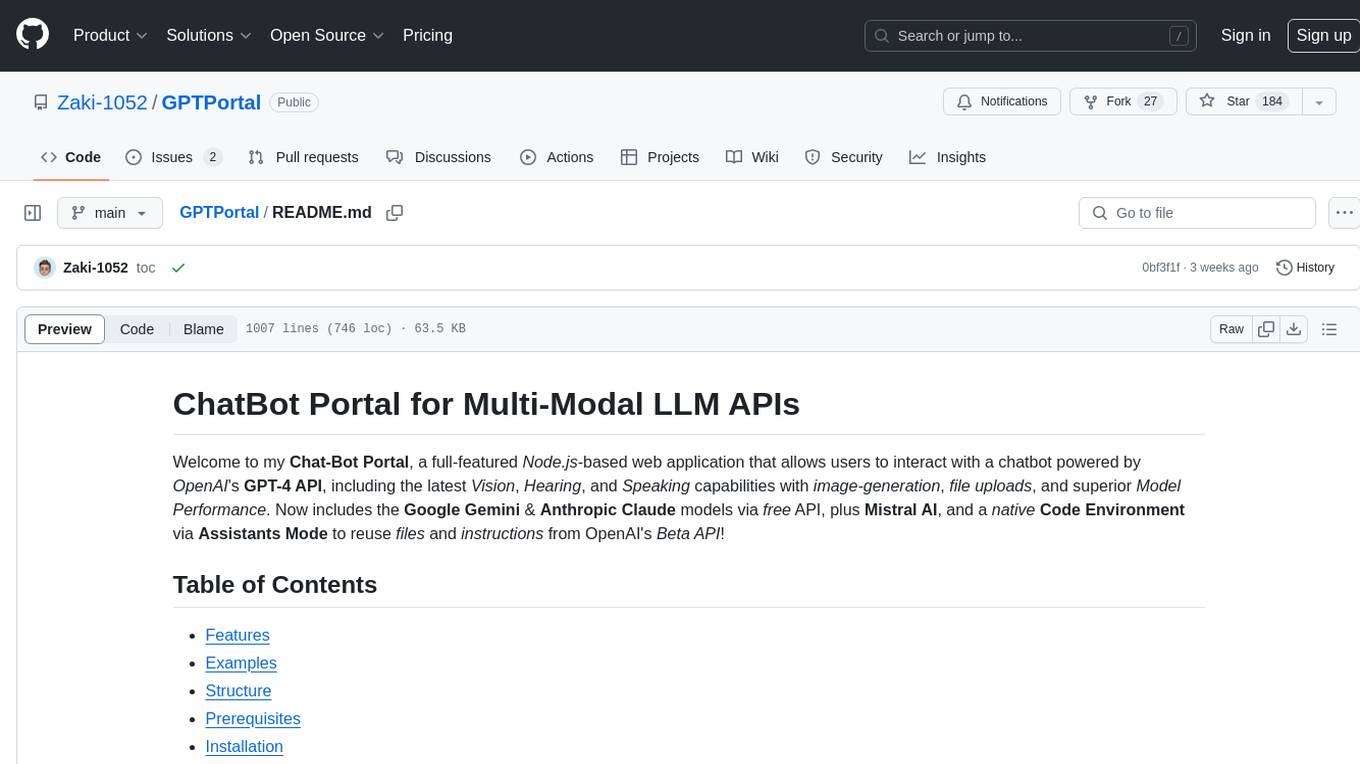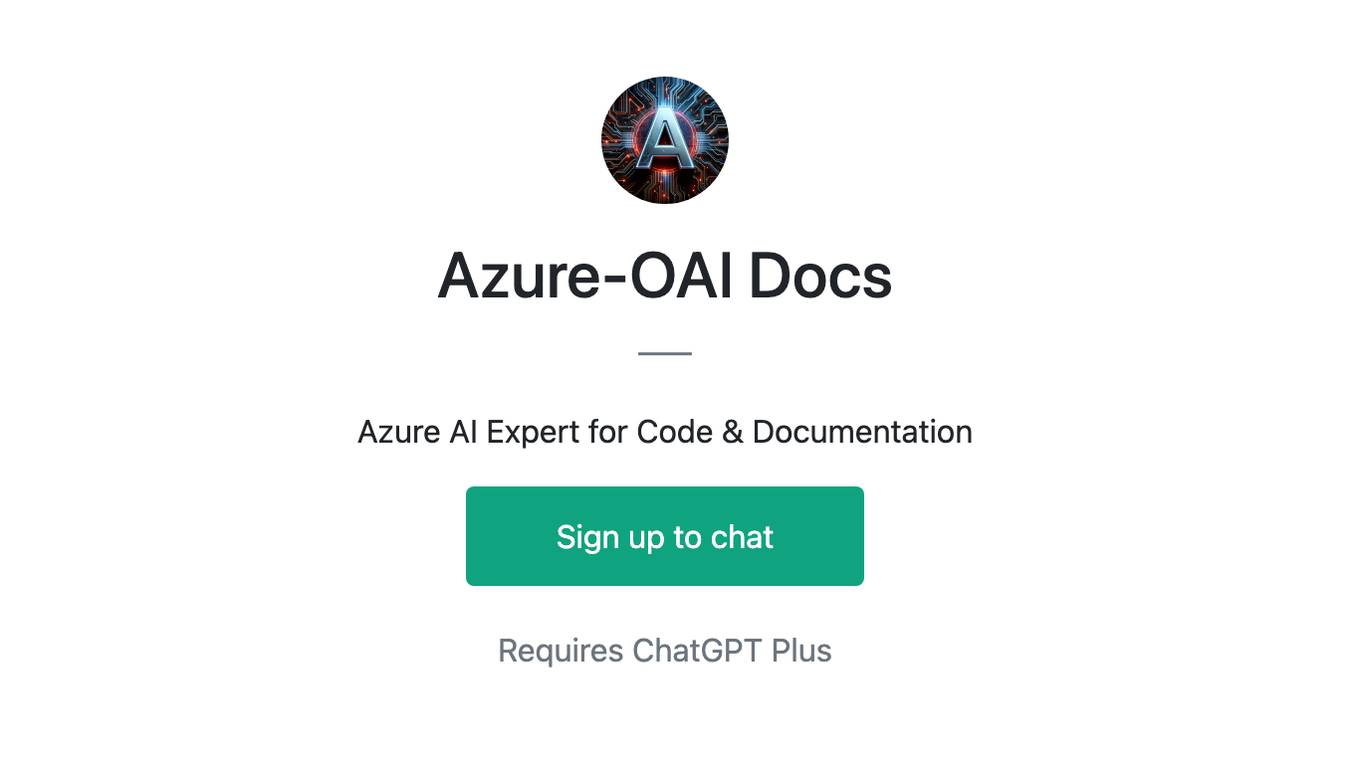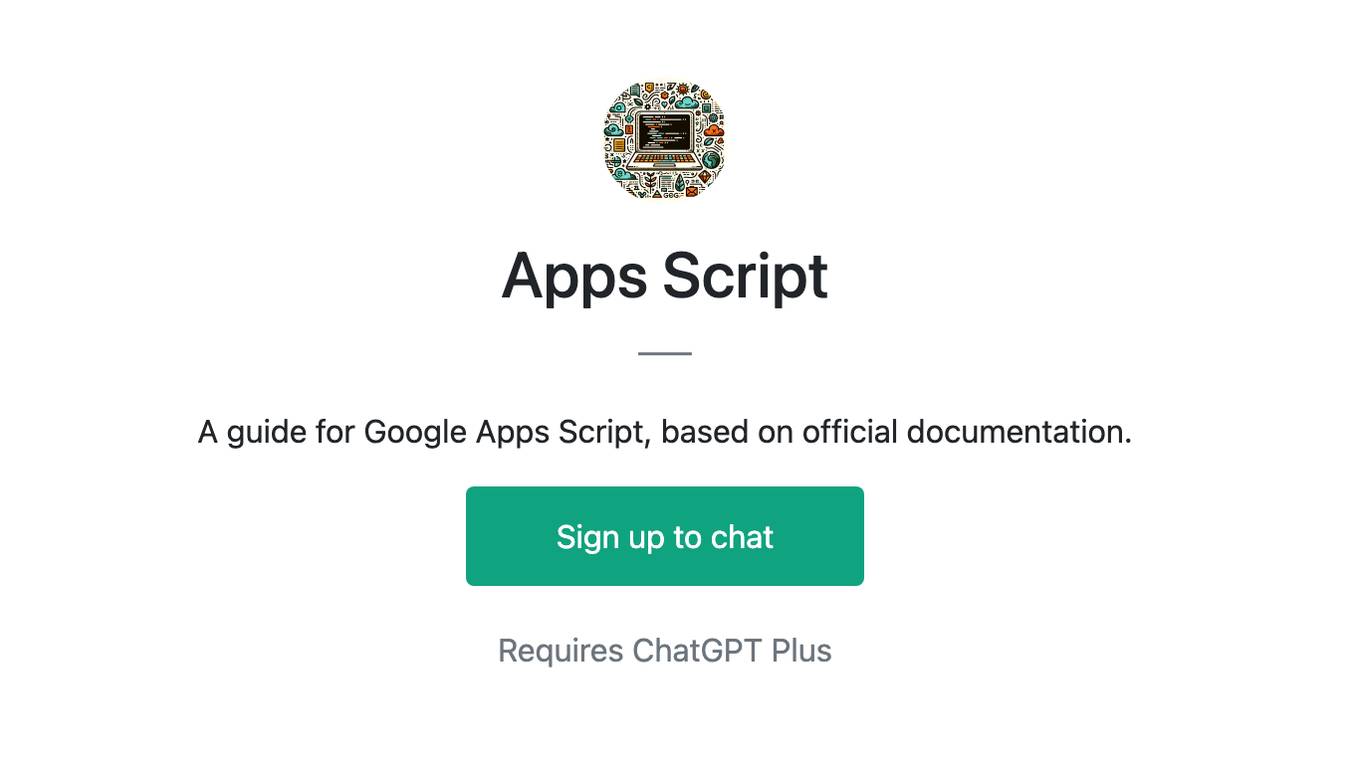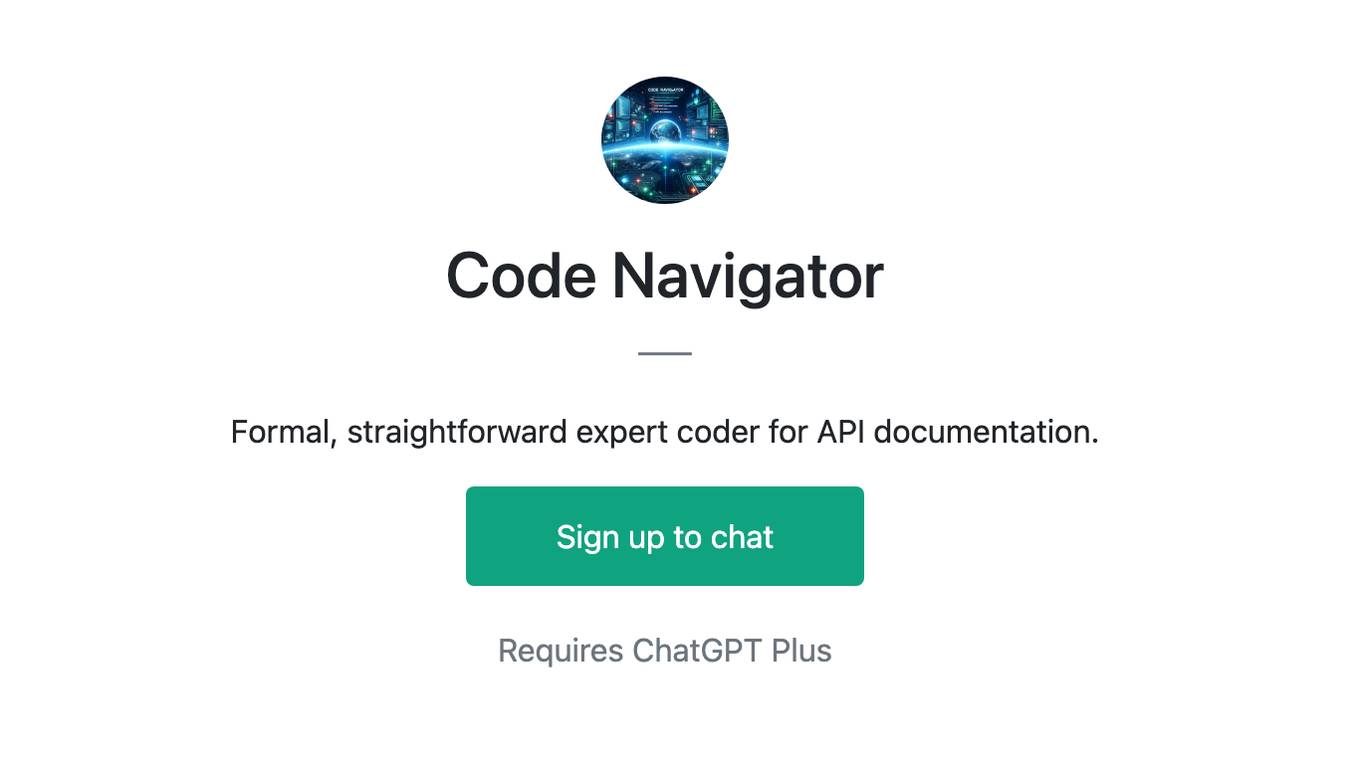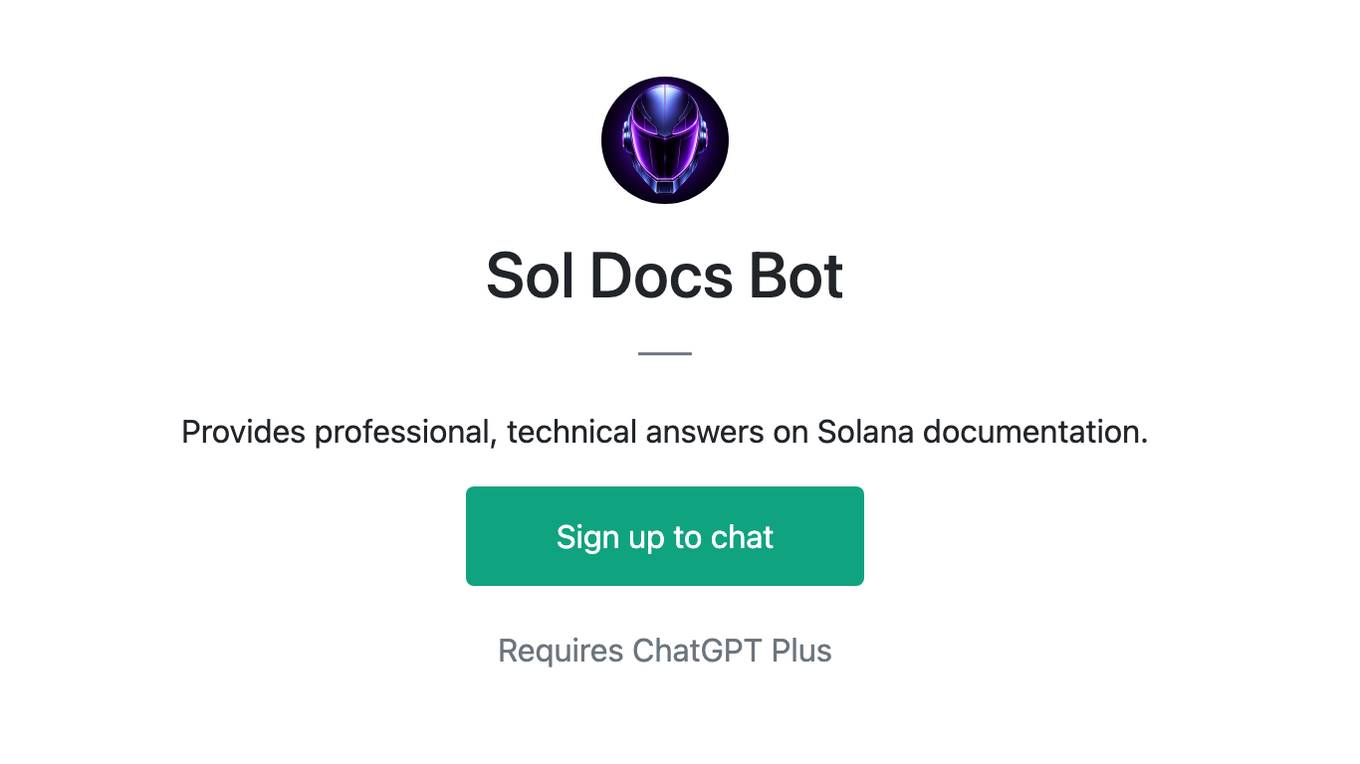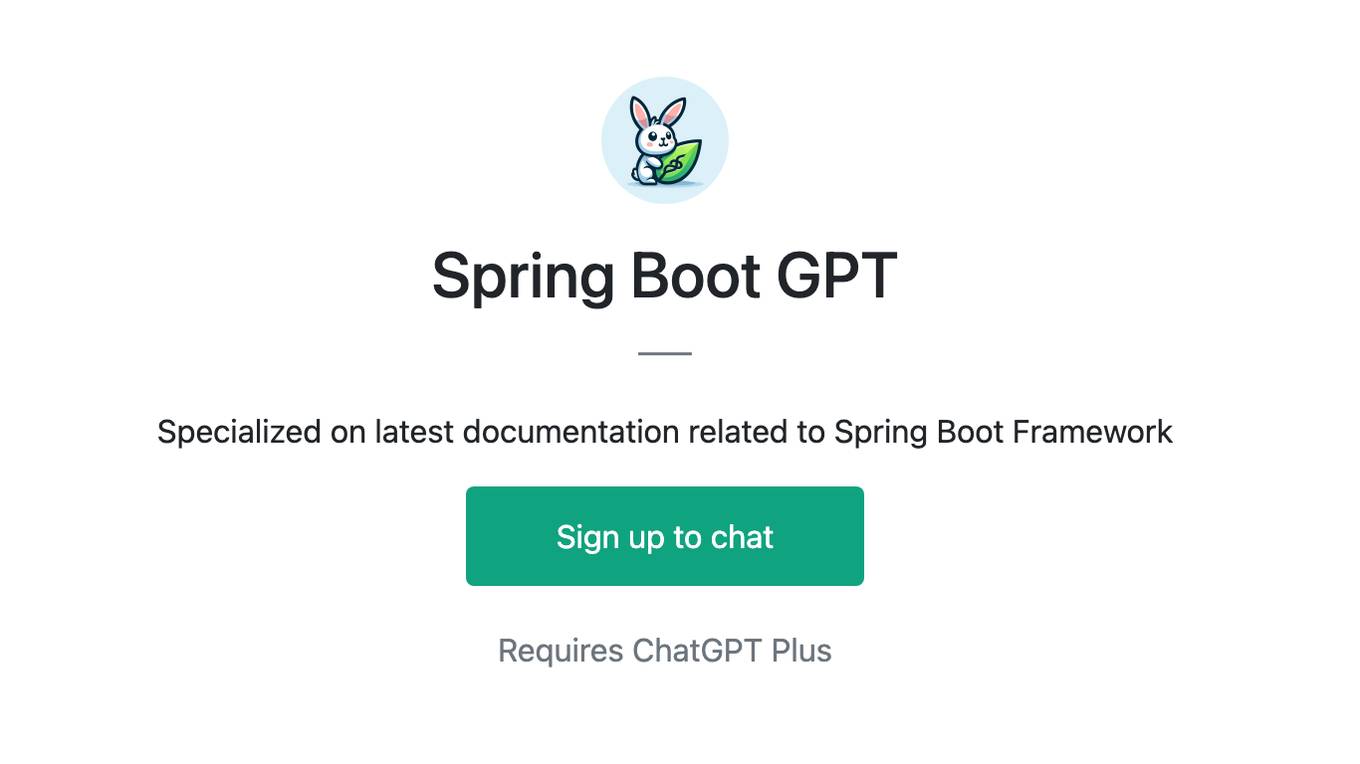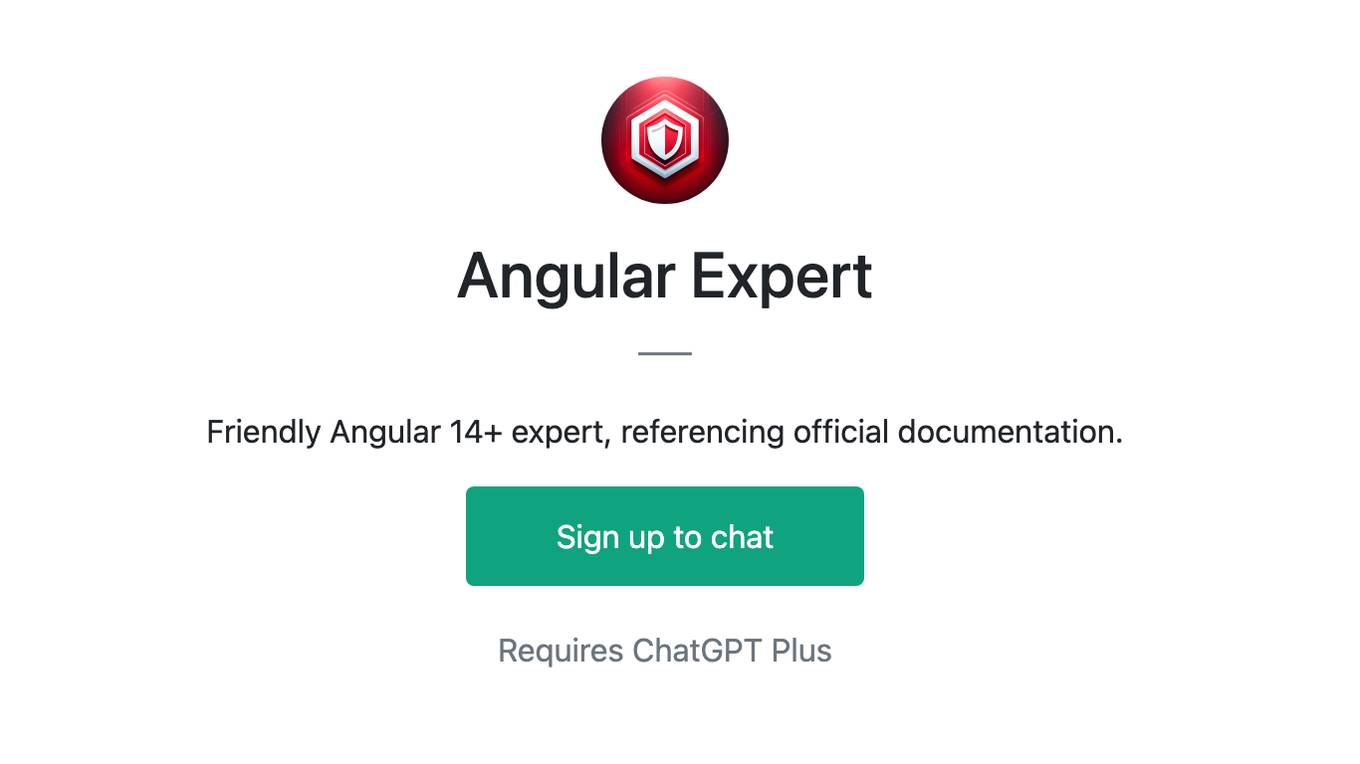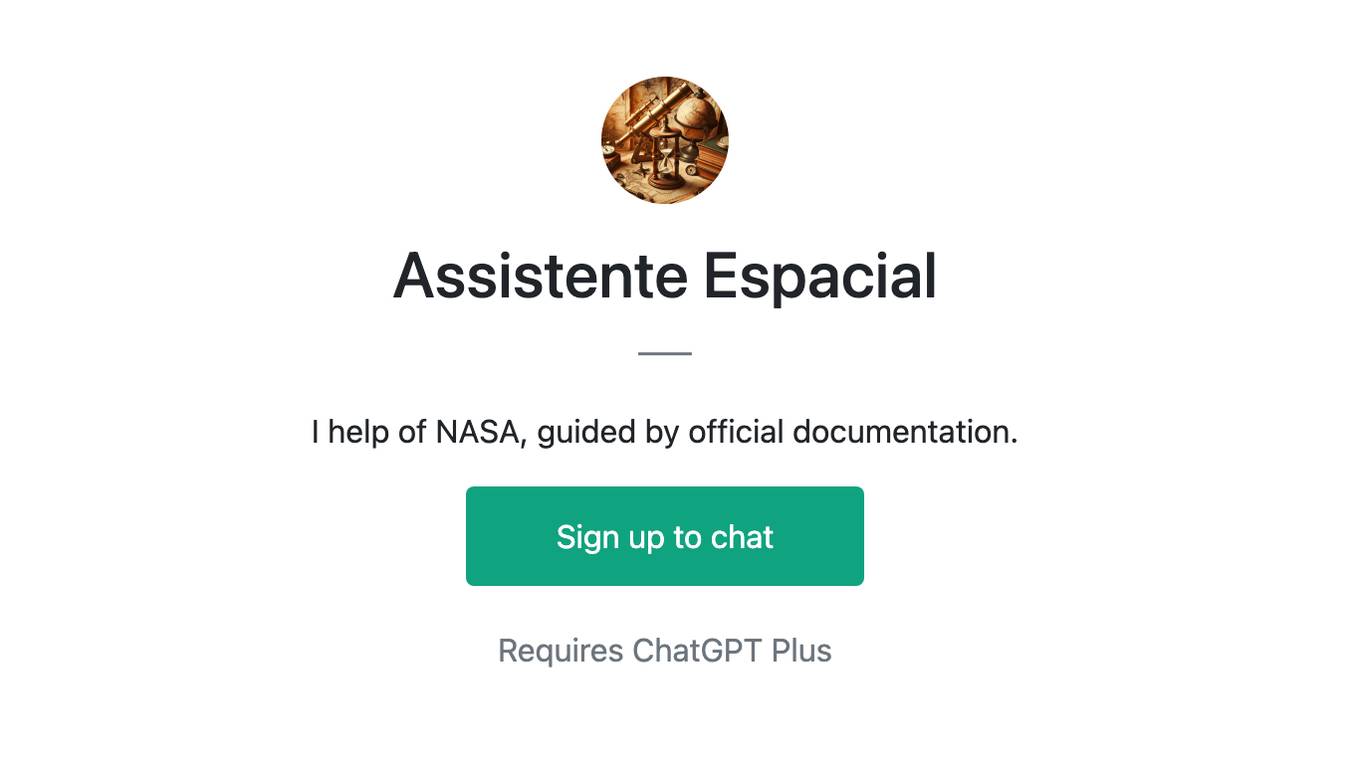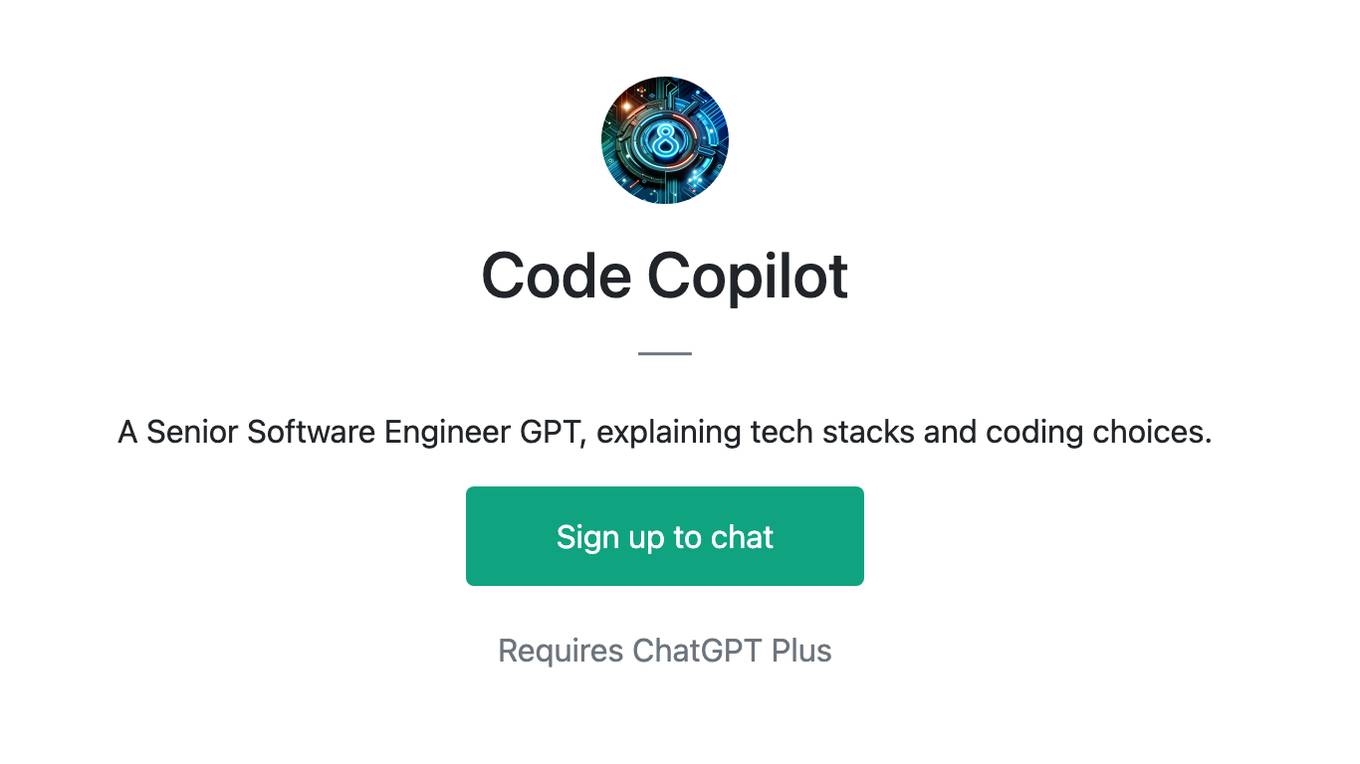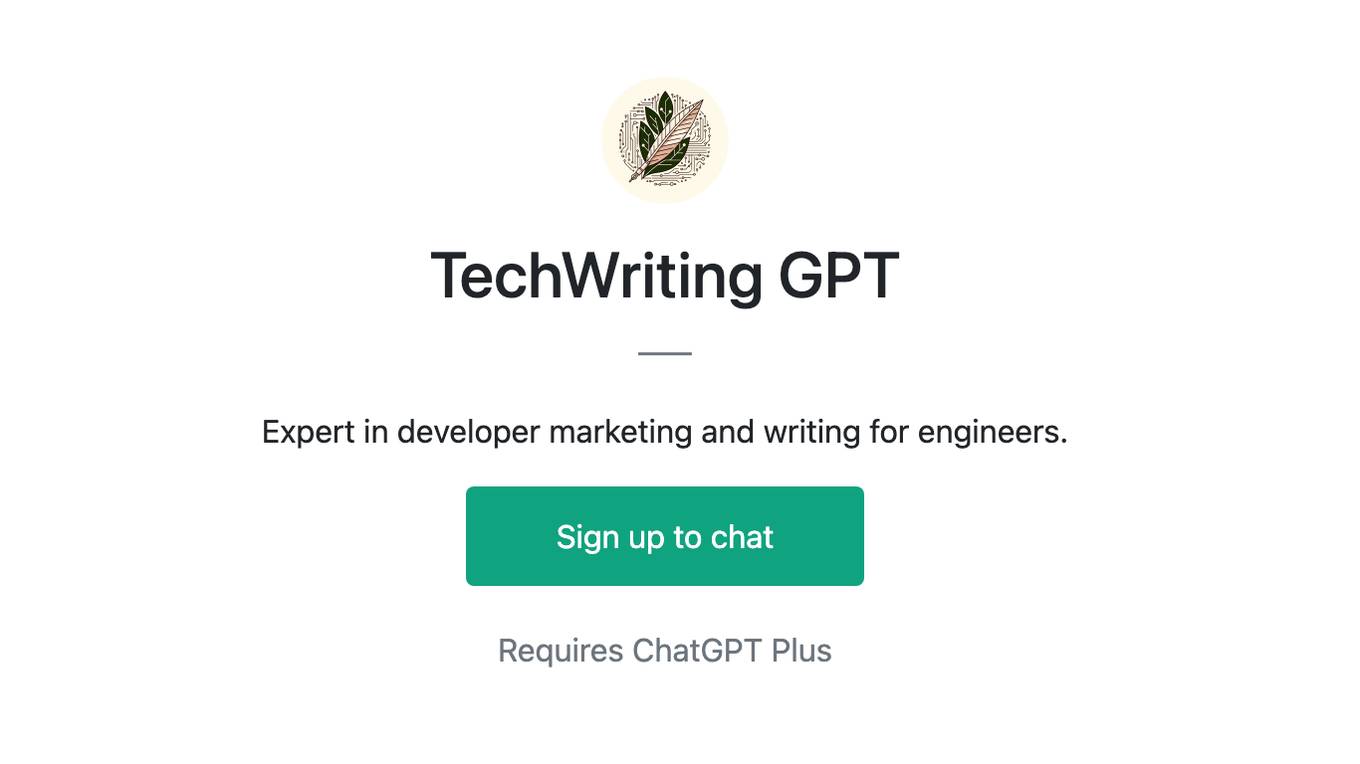Best AI tools for< documentation engineer >
20 - AI tool Sites
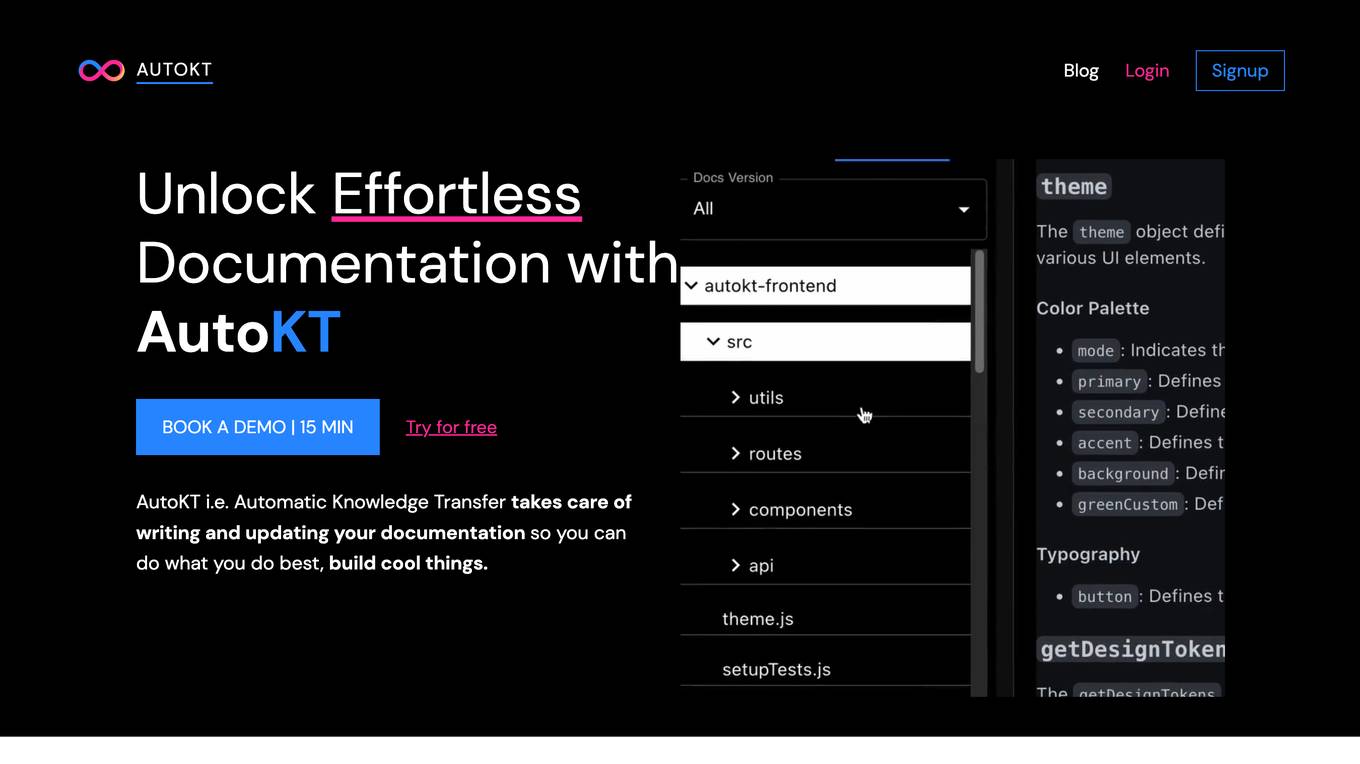
AutoKT
AutoKT is a revolutionary tool that automates the documentation process, freeing up developers to focus on building cool things. It features an AI-powered documentation writer that generates comprehensive documentation from code, eliminating the need for manual writing and maintenance. AutoKT also enables asynchronous knowledge transfer by keeping documentation in sync with code changes and providing a query engine for easy access to information. With AutoKT, teams can streamline knowledge transfer, reduce documentation time, and improve overall productivity.
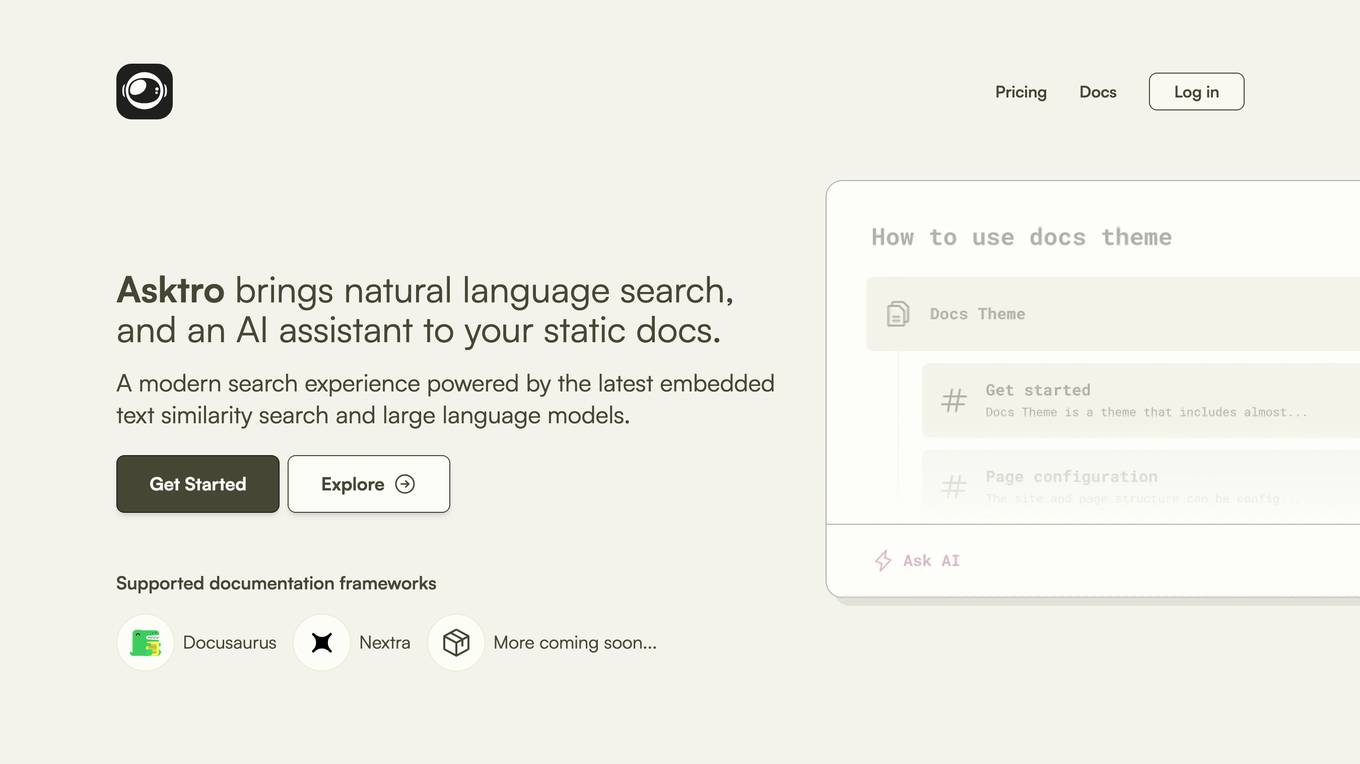
Asktro
Asktro brings natural language search and an AI assistant to your static docs. It offers a modern search experience powered by the latest embedded text similarity search and large language models. Asktro provides a ready-to-go search UI to add to your documentation site and a plugin to ingest and index your documentation. It allows users to search broader topics by indexing sections of your documentation in a vector store, enabling similarity search over the embedded text. Additionally, Asktro provides an AI assistant that synthesizes search results to respond based on the documentation and the specific question.
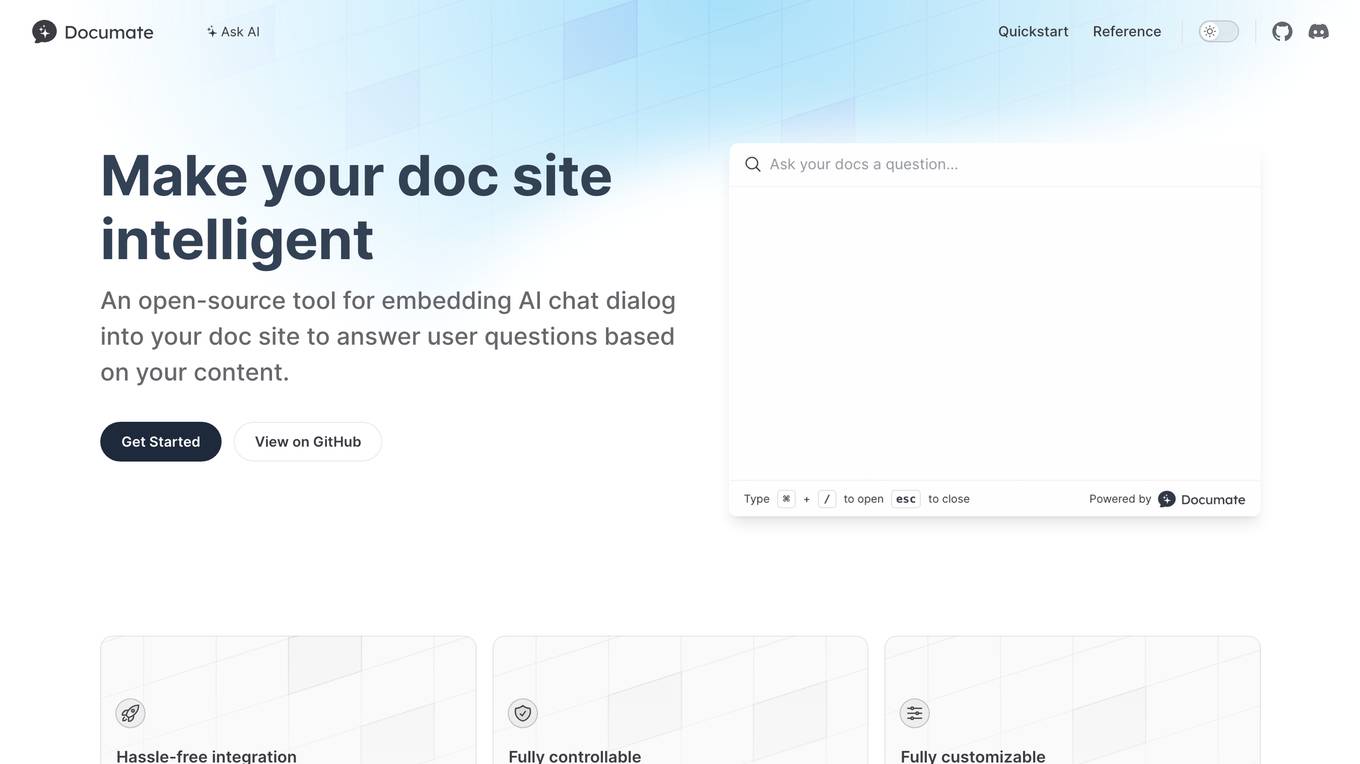
Documate
Documate is an open-source tool that allows you to embed AI chat dialog into your documentation site. This enables users to ask questions about your content and receive answers based on the information provided. Documate is easy to integrate with popular documentation site generators such as VitePress, Docusaurus, and Docsify, and does not require any AI or LLM knowledge. You have full control over the code, data, and content indexing, and the UI is fully customizable to meet your specific needs.
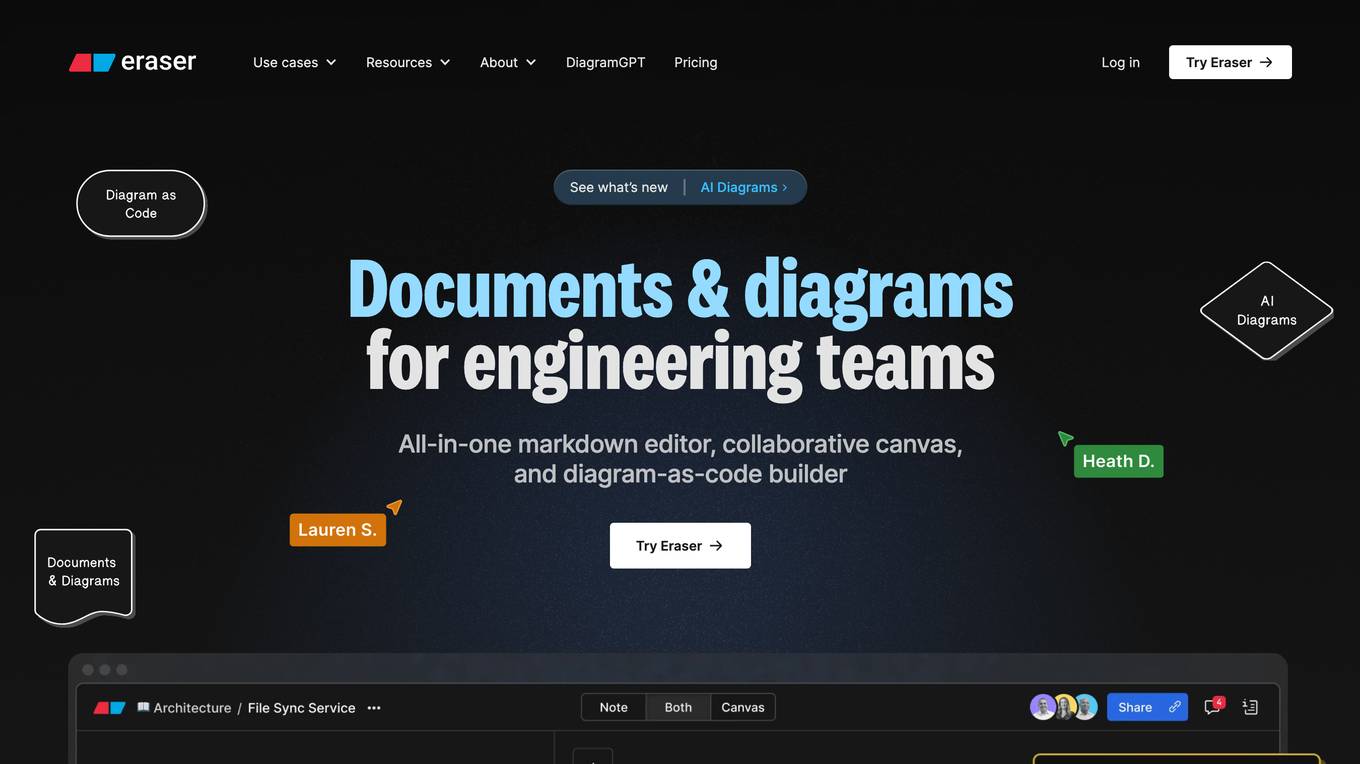
Eraser AI
Eraser AI is an all-in-one markdown editor, collaborative canvas, and diagram-as-code builder designed to assist engineering teams in creating diagrams, technical design docs, and visual documentation. It offers features such as creating architecture diagrams, data flow diagrams, wireframes, and more. Eraser AI aims to streamline collaboration, knowledge sharing, and documentation processes for technical teams, providing a multiplayer-first tool with robust file management and fast search capabilities. The tool is loved by technical teams for its usability, performance, version history, and workflow integration, making it a valuable asset for developers and engineers.
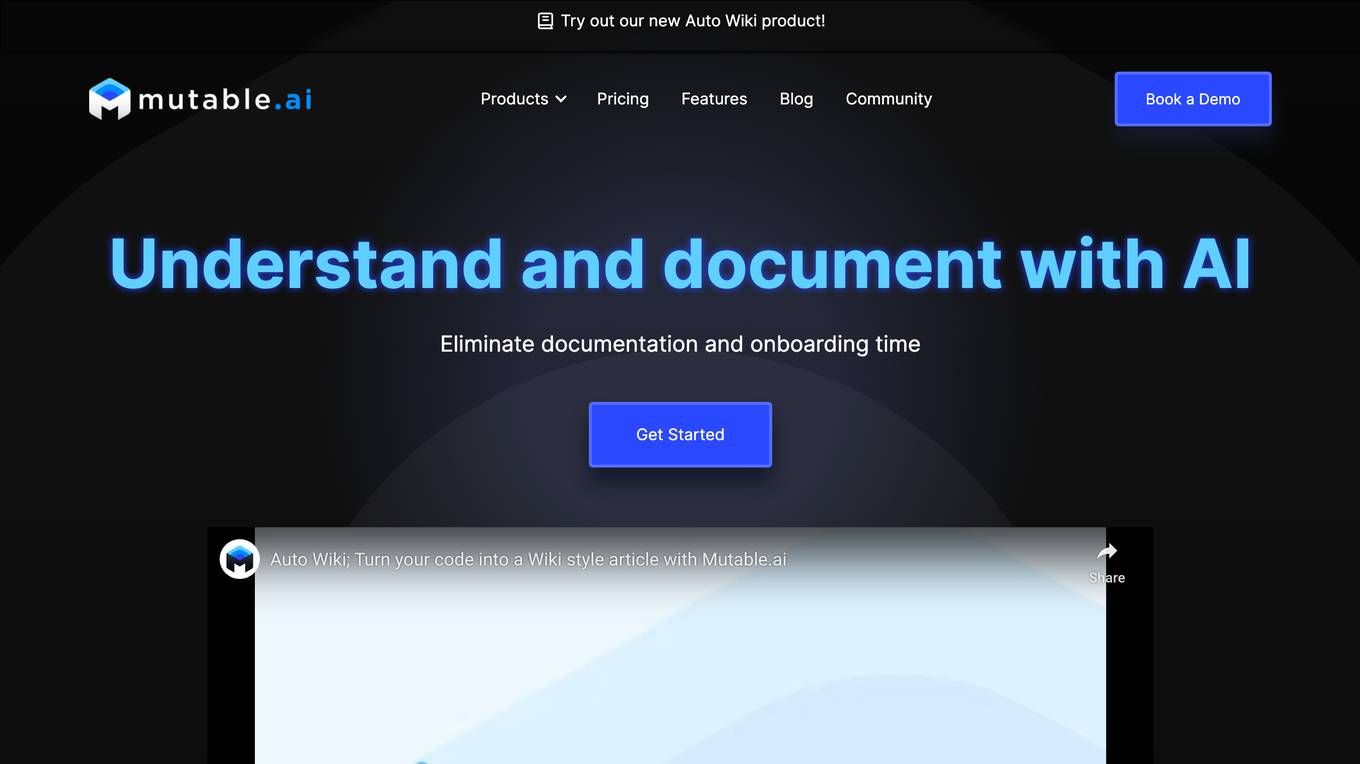
Mutable.ai
Mutable.ai is an AI application designed to create living documentation for codebases using AI technology. It automatically generates wiki-style articles from codebases, keeping them up-to-date with AI. The application allows users to chat with their codebase, make code diagrams automatically, and receive updates when the code changes. It aims to revolutionize engineering onboarding by providing accurate and real-time documentation for software engineers.
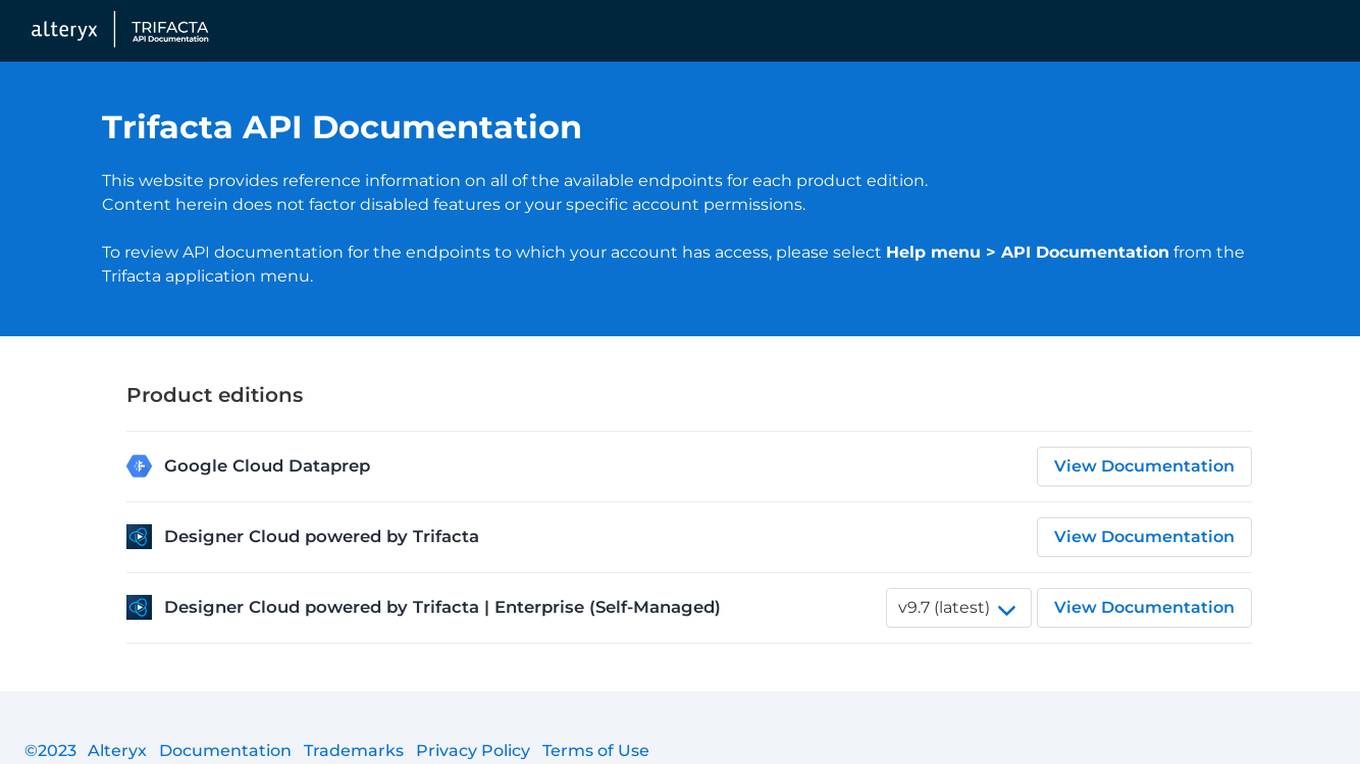
Trifacta API Documentation
Trifacta API Documentation provides reference information on all of the available endpoints for each product edition. This website does not factor disabled features or your specific account permissions. To review API documentation for the endpoints to which your account has access, please select Help menu > API Documentation from the Trifacta application menu.
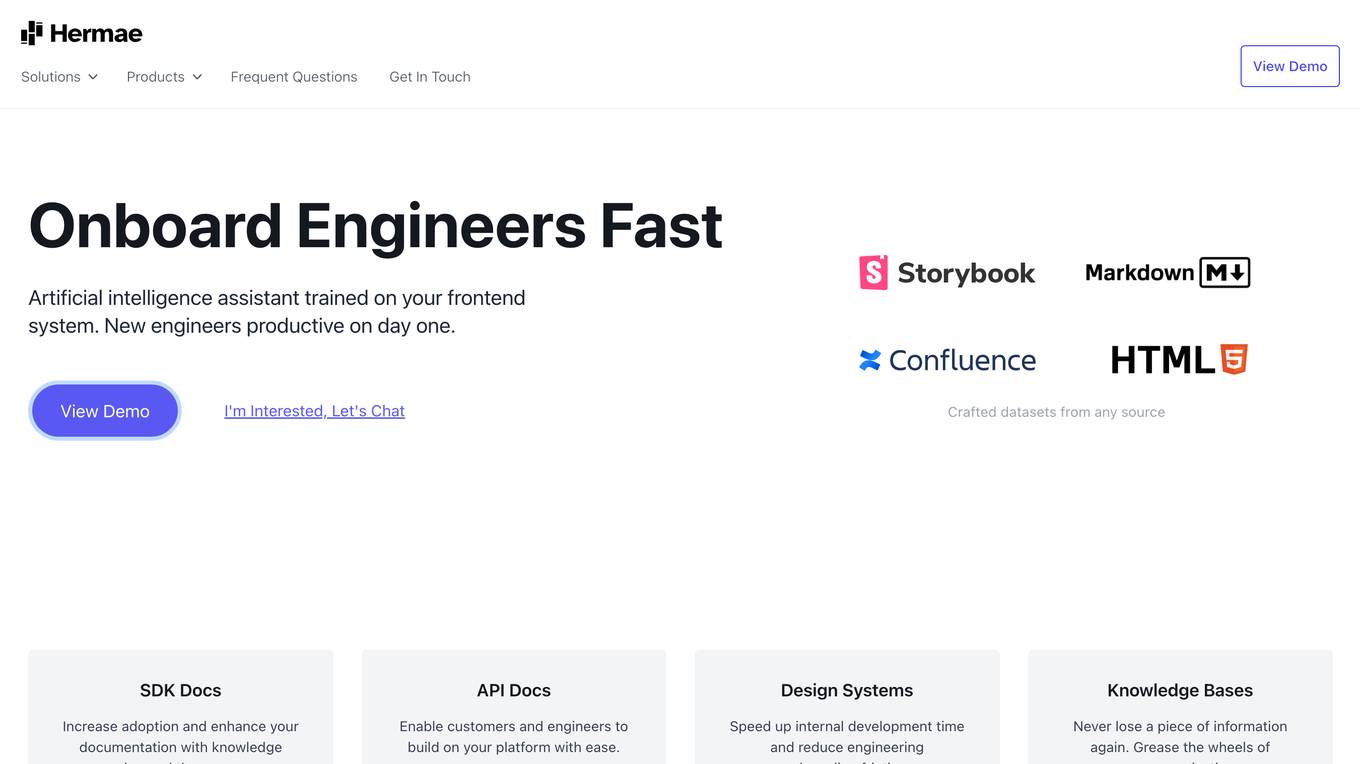
Hermae Solutions
Hermae Solutions offers an AI Assistant for Enterprise Design Systems, providing onboarding acceleration, contractor efficiency, design system adoption support, knowledge distribution, and AI documentation assistance. The platform enables users to train custom AI assistants from their documentation, boost frontend productivity with a Storybook embed plugin, and continuously train AI profiles. With features like crafted datasets, SDK and API documentation, and design system speedup, Hermae Solutions aims to streamline engineering processes and knowledge sharing within organizations.
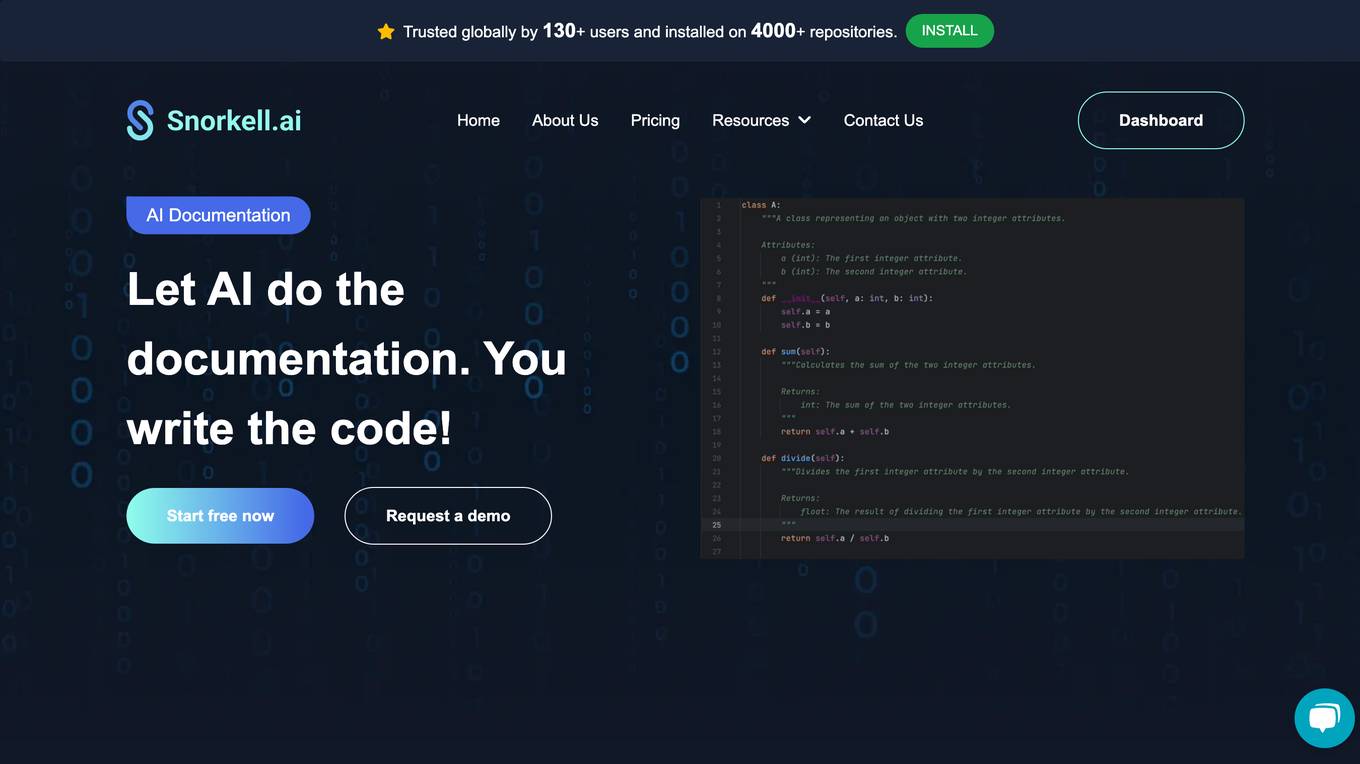
Snorkell.ai
Snorkell.ai is an automated documentation generation tool that uses AI to create and update docstrings for GitHub projects. It supports multiple programming languages, including Python, JavaScript, TypeScript, Java, and Kotlin. Snorkell.ai integrates with GitHub and automatically generates docstrings whenever a pull request is merged, ensuring that documentation is always up-to-date with the codebase. It helps developers save time and effort by automating the documentation process, leading to improved code quality and reduced onboarding time.
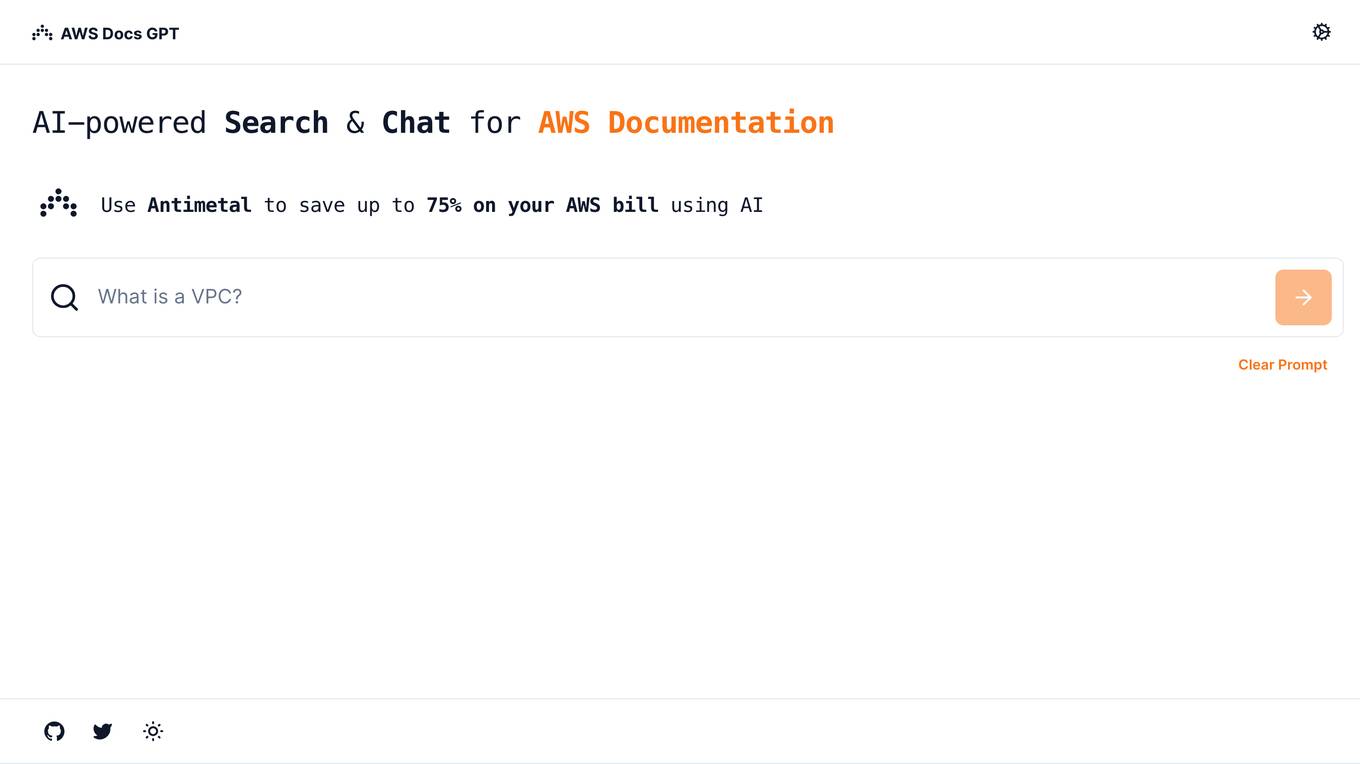
AWS Docs GPT
AWS Docs GPT is an AI-powered search and chat tool designed specifically for AWS Documentation users. It utilizes advanced AI technology to enhance the search experience and provide interactive chat support for users navigating through AWS documentation. With AWS Docs GPT, users can efficiently search for information, receive AI-generated prompts, and optimize their AWS bill by up to 75% using the Antimetal feature. The tool aims to streamline the documentation browsing process and improve user productivity within the AWS ecosystem.
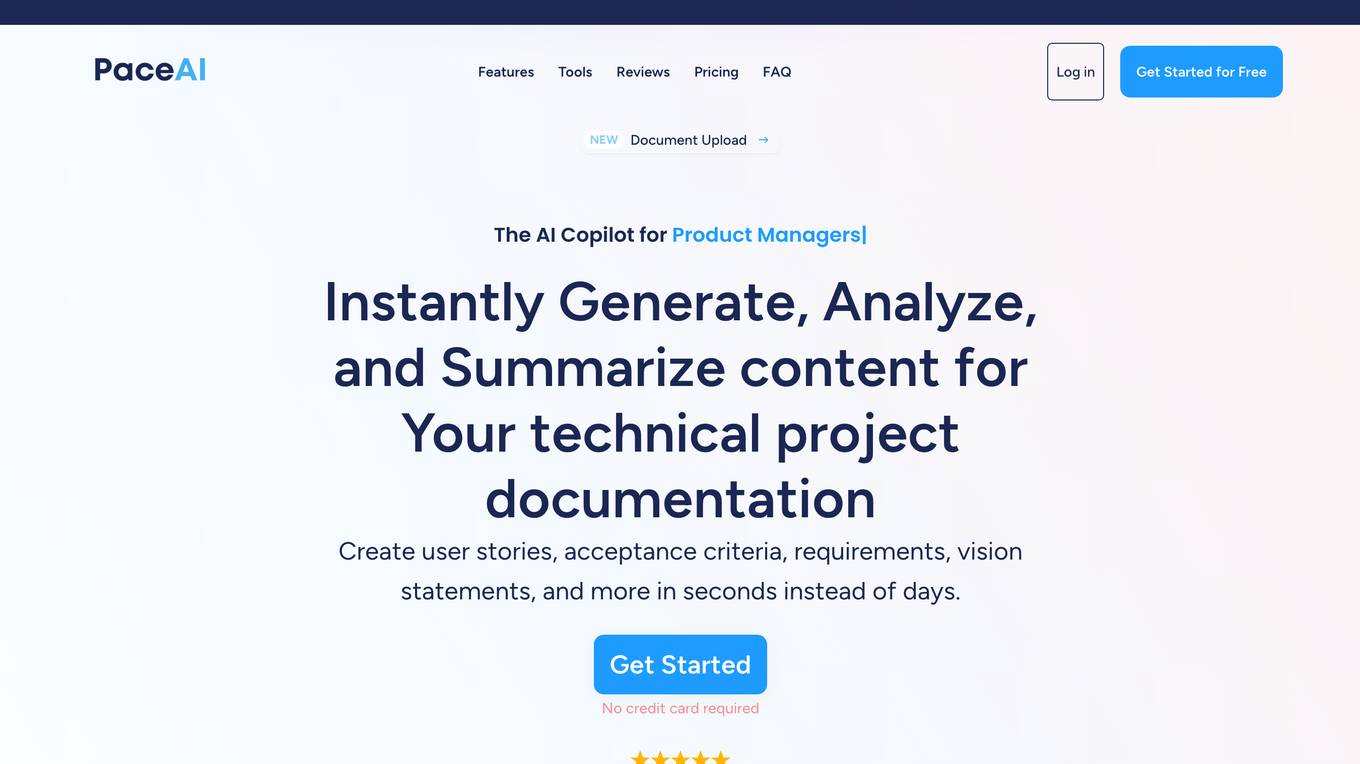
PaceAI
PaceAI is an AI companion for non-technical IT professionals to generate, analyze, and simplify technical documentation. It uses advanced natural language processing to understand user requirements and automatically generate clear, concise technical documentation tailored to specific projects. The application offers 35+ powerful AI tools optimized for IT work, including user story generation, requirements generation, flowchart creation, and product vision generation. PaceAI aims to save time for IT professionals by streamlining documentation processes and enabling better collaboration with stakeholders.
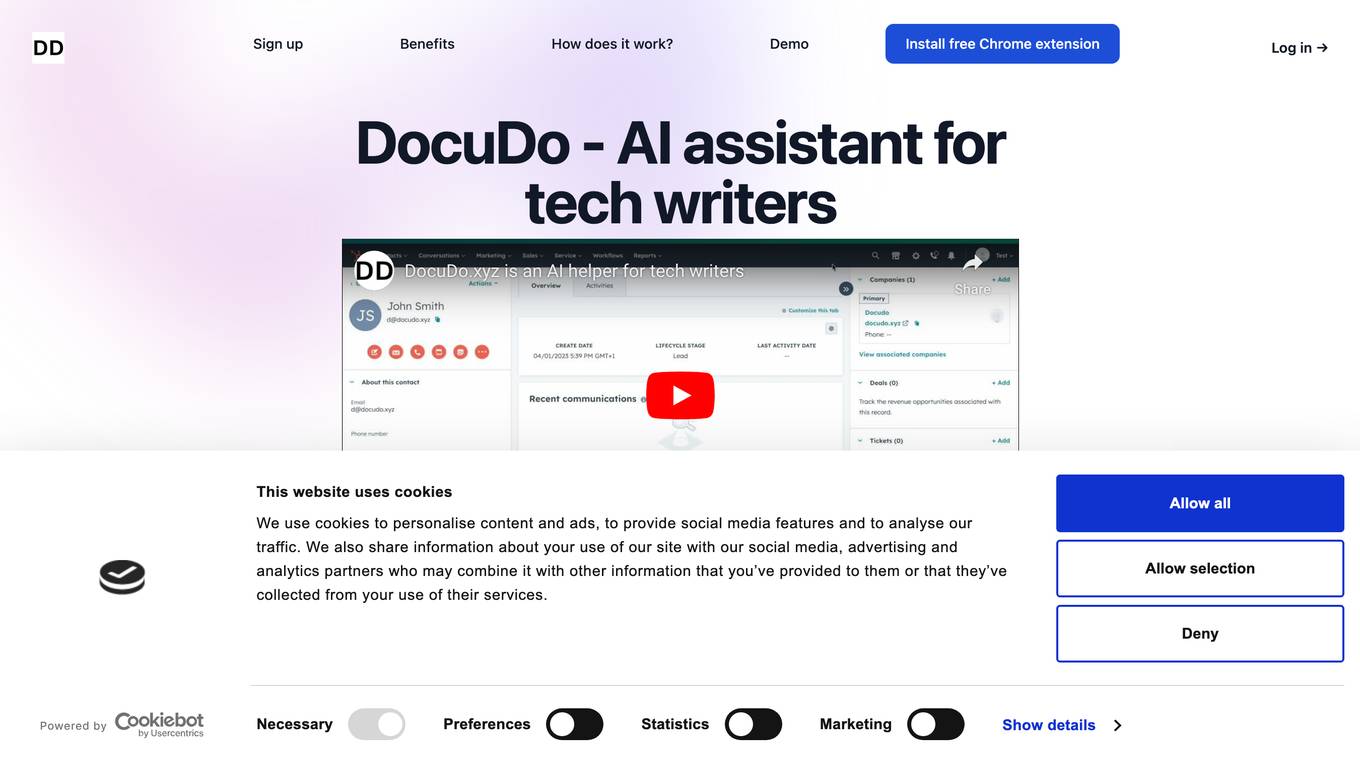
DocuDo
DocuDo is an AI assistant for tech writers that helps you write support documentation 10x faster. With DocuDo, you can record a screencast of your product, and DocuDo will automatically generate the corresponding support article. DocuDo uses LLM, such as ChatGPT, to prepare content and screenshots, so you can be sure that your documentation is accurate and up-to-date.
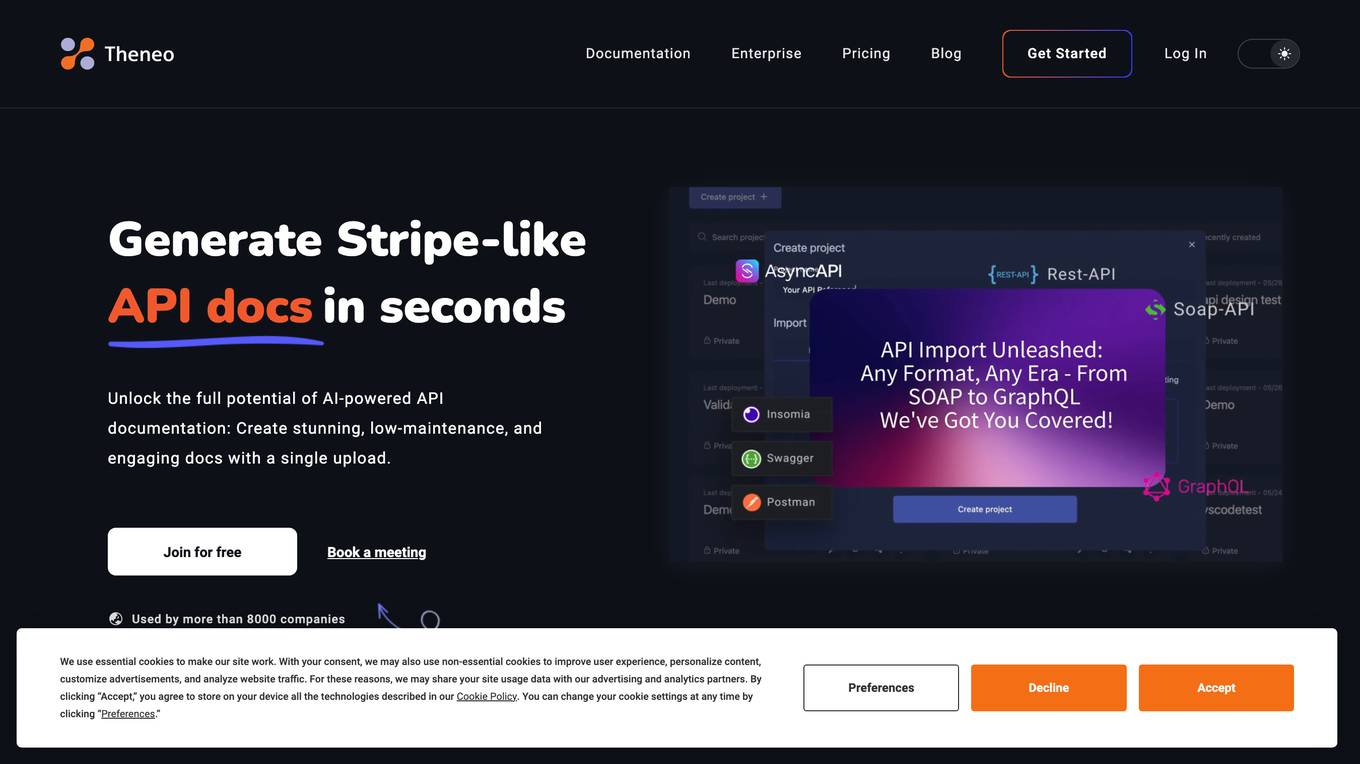
Theneo
Theneo is an AI-powered API documentation tool that helps developers create, maintain, and publish beautiful, interactive API documentation. With Theneo, you can automatically generate API descriptions and summaries, collaborate with your team in real-time, and customize your documentation to match your brand. Theneo also integrates with your favorite development tools and source code editors, so you can create and maintain your documentation right from your workflow.
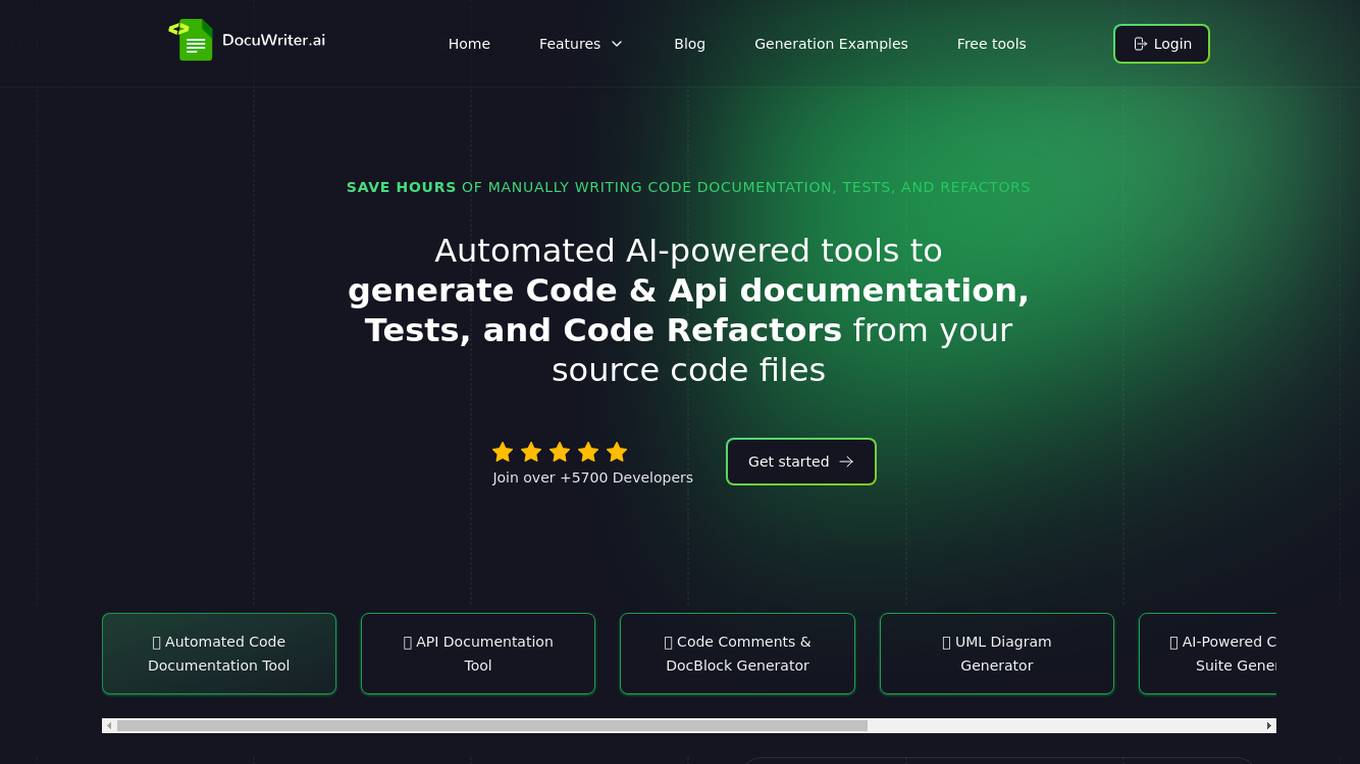
DocuWriter.ai
DocuWriter.ai is an AI-powered tool that helps developers automate code documentation, testing, and refactoring. It uses natural language processing and machine learning algorithms to generate accurate and consistent documentation, test suites, and optimized code. DocuWriter.ai integrates with popular programming languages and development environments, making it easy for developers to improve the quality and efficiency of their code.
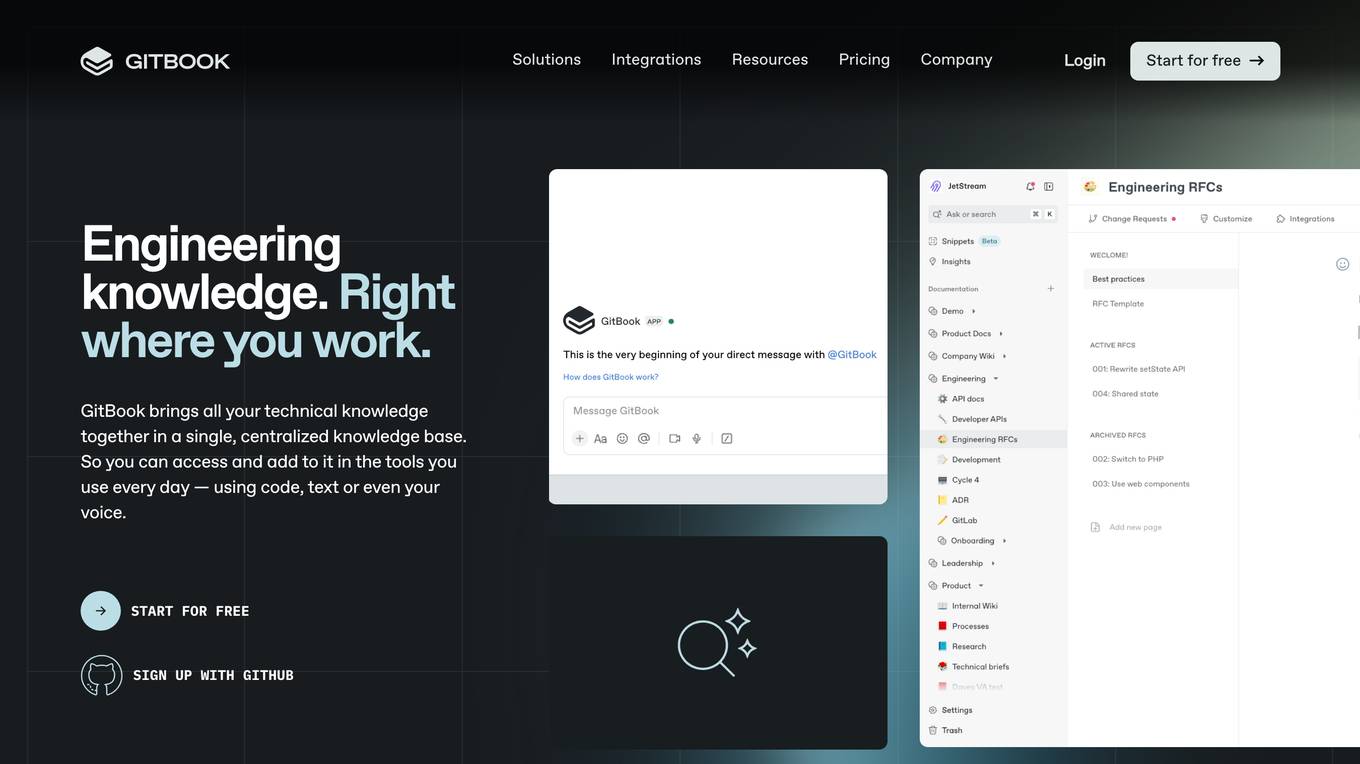
GitBook
GitBook is a knowledge management platform that helps engineering teams centralize, access, and add to their technical knowledge in the tools they use every day. With GitBook, teams can capture knowledge from conversations, code, and meetings, and turn it into useful, readable documentation. GitBook also offers a variety of features to help teams collaborate on documentation, including a branch-based workflow, real-time editing, and user permissions.
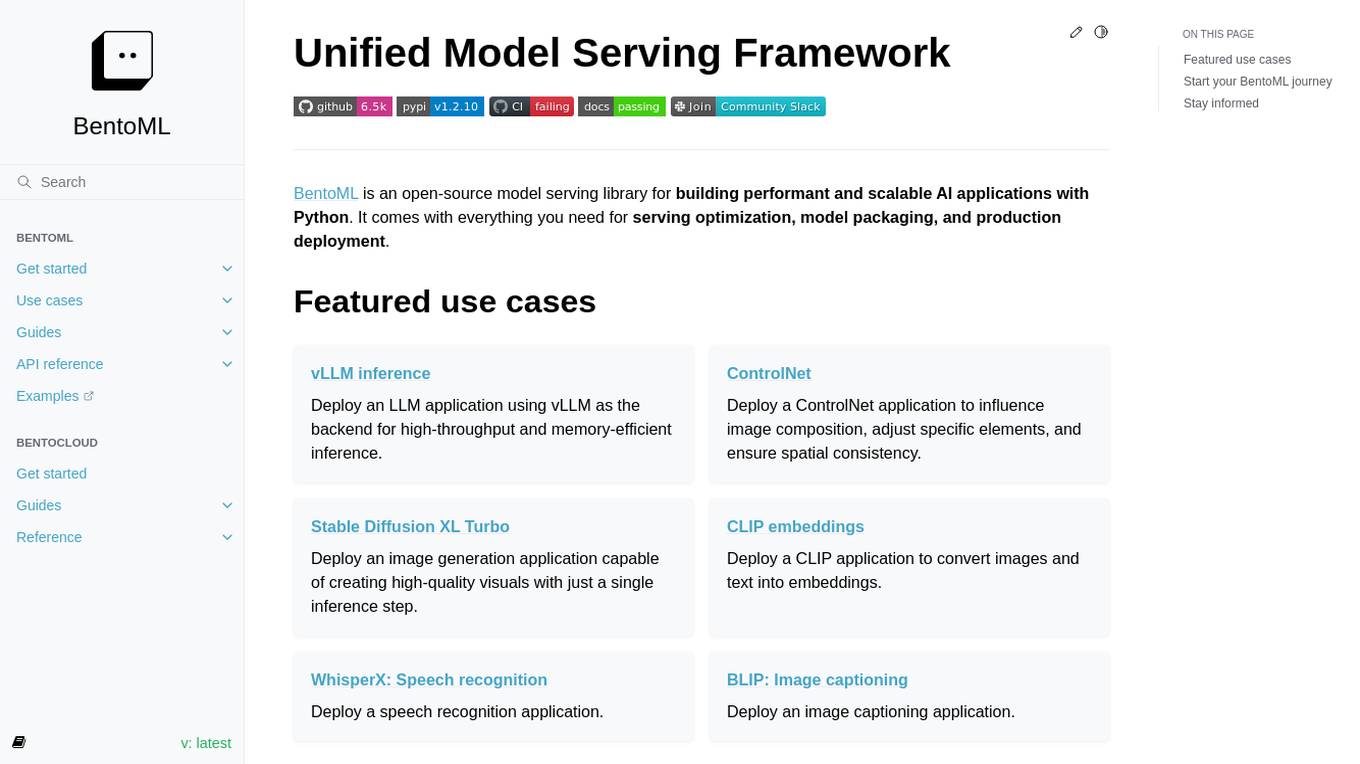
BentoML
BentoML is a framework for building reliable, scalable, and cost-efficient AI applications. It provides everything needed for model serving, application packaging, and production deployment.
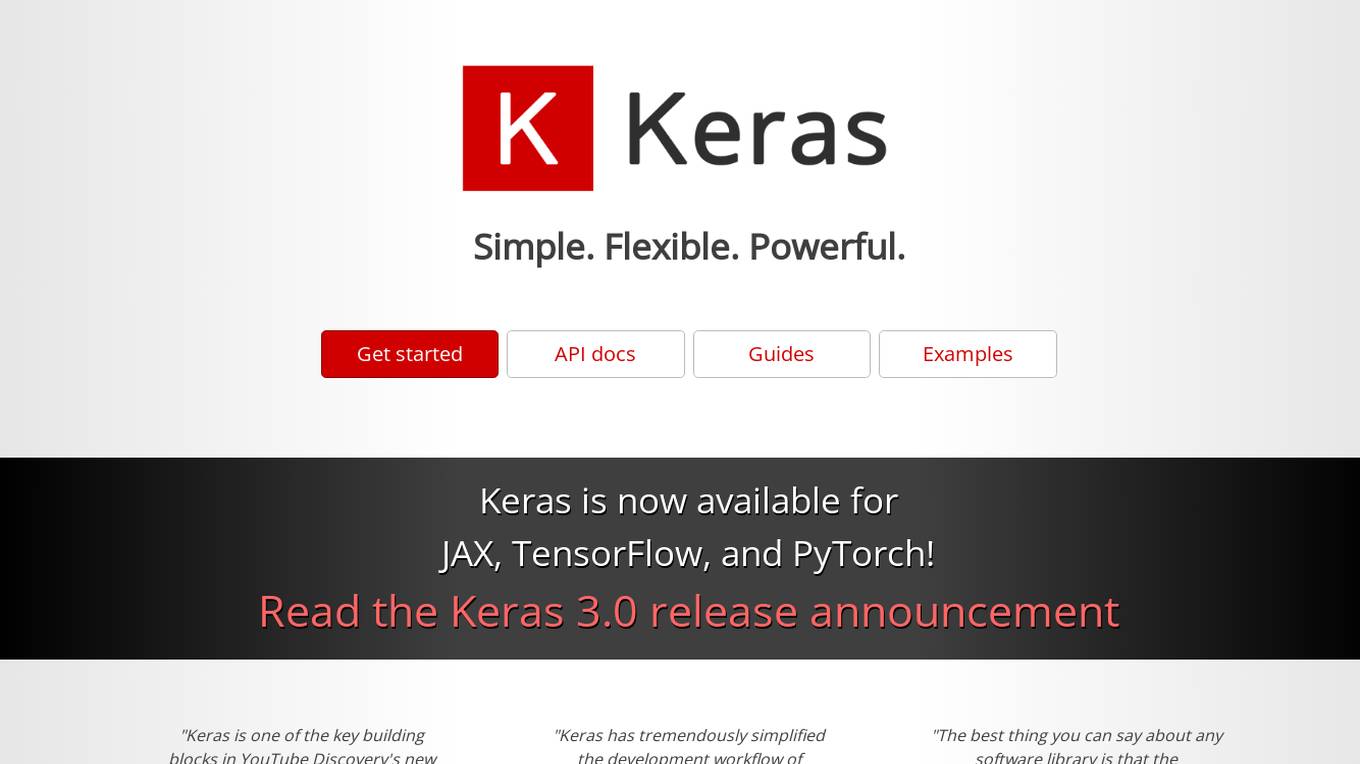
Keras
Keras is an open-source deep learning API written in Python, designed to make building and training deep learning models easier. It provides a user-friendly interface and a wide range of features and tools to help developers create and deploy machine learning applications. Keras is compatible with multiple frameworks, including TensorFlow, Theano, and CNTK, and can be used for a variety of tasks, including image classification, natural language processing, and time series analysis.
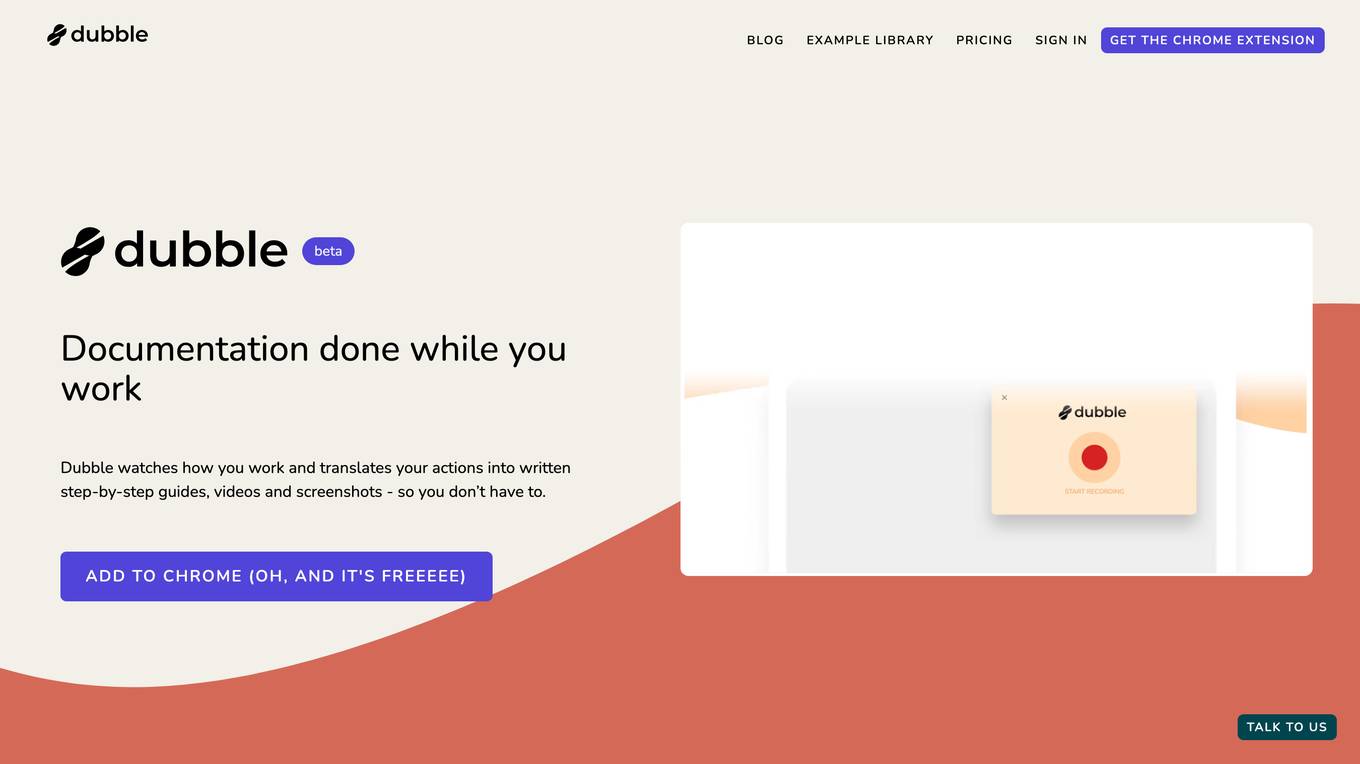
Dubble
Dubble is a free tool that helps you create step-by-step guides, tutorials, and onboarding resources for your processes. It uses AI to watch how you work and translate your actions into written instructions and screenshots. This makes it easy to document your processes without having to write anything yourself.
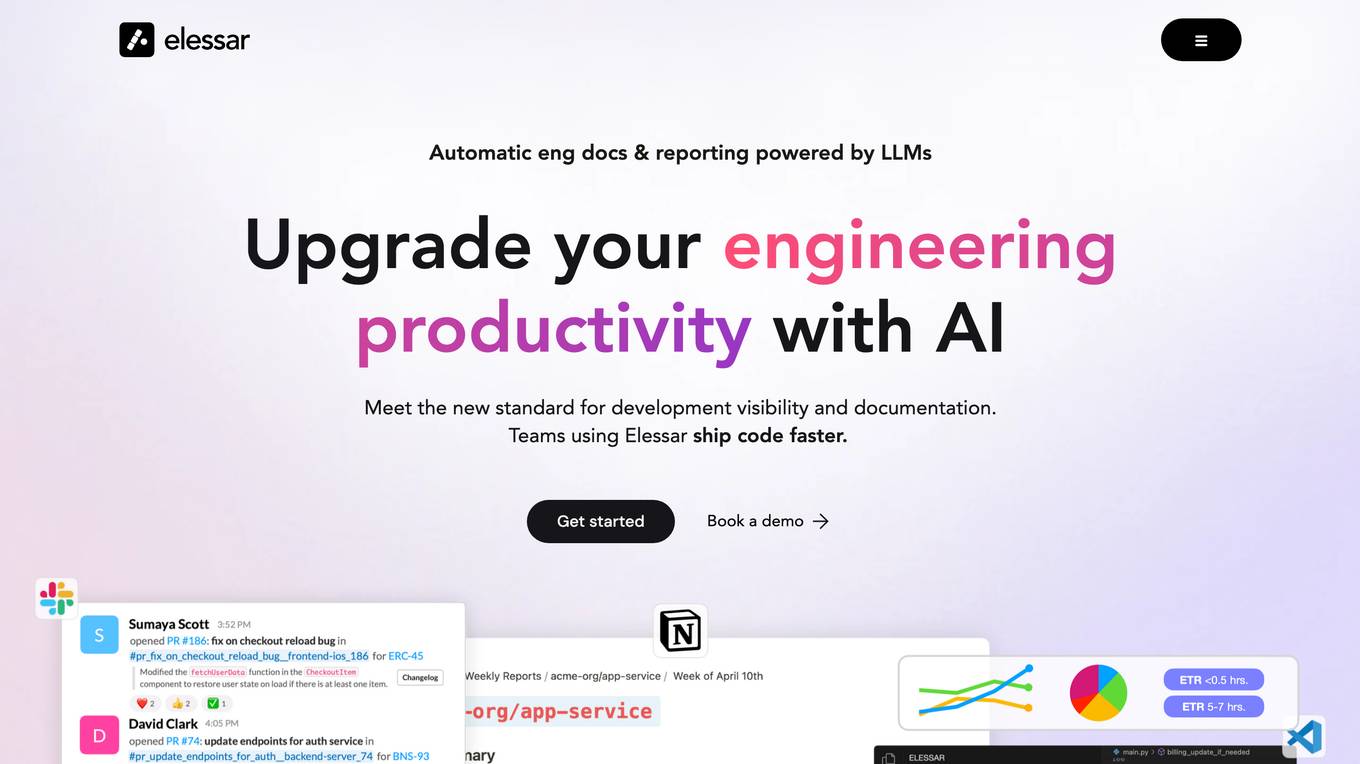
Elessar
Elessar is an AI-powered platform designed to enhance engineering productivity by providing automatic documentation, reporting, and visibility for development teams. It seamlessly integrates with existing ecosystems, generating pull request changelogs, Notion documentation, Slack bot functionalities, VS Code extensions, and issue tracking. Elessar ensures data privacy and security by following SOC II compliant policies and using OpenAI APIs for inference-based processing. It aims to streamline communication, improve speed, and increase visibility within engineering organizations.
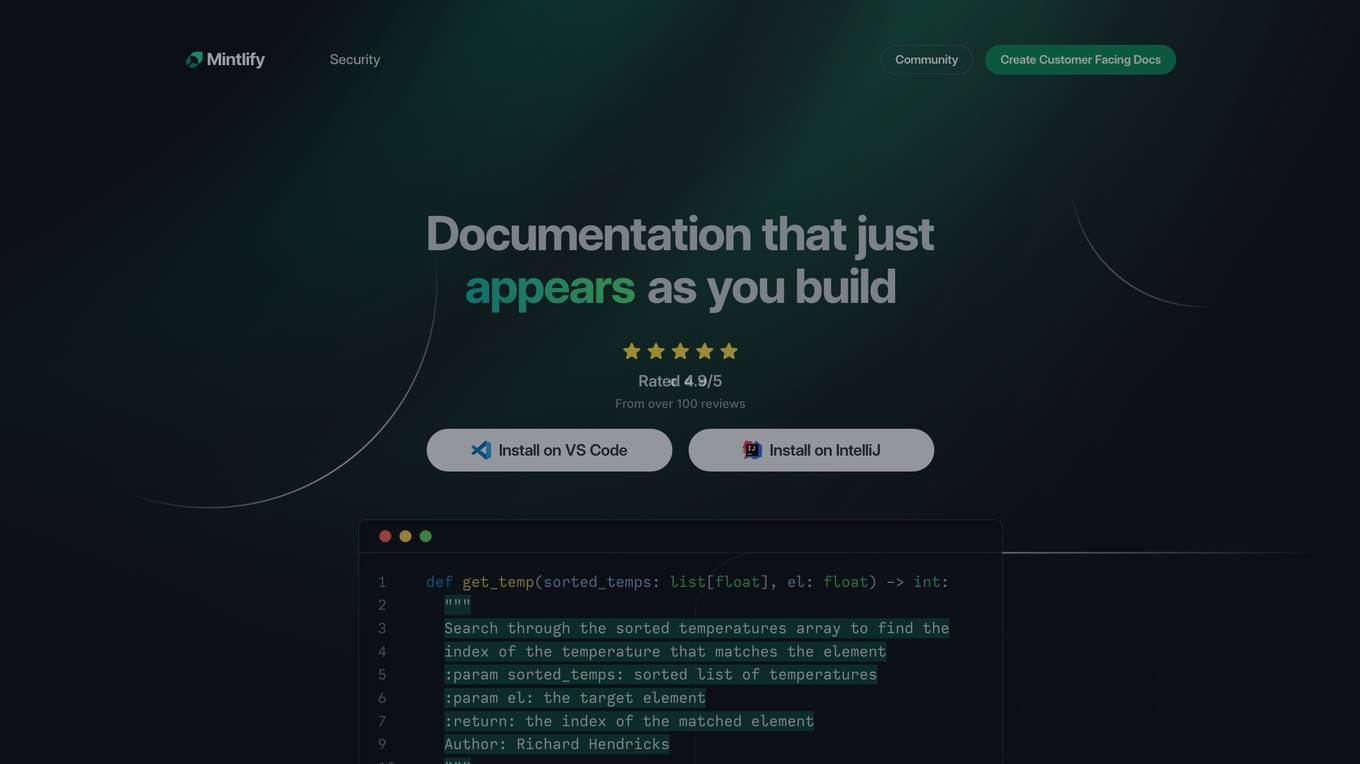
Mintlify
Mintlify is an AI-powered documentation generation tool designed for developers to effortlessly create customer-facing documentation as they build. It helps users save time and improve their codebase by automatically generating function docstrings in a human-readable format. Mintlify is highly praised by developers for its accuracy in understanding code and writing precise descriptions, making it a valuable asset for coding projects.
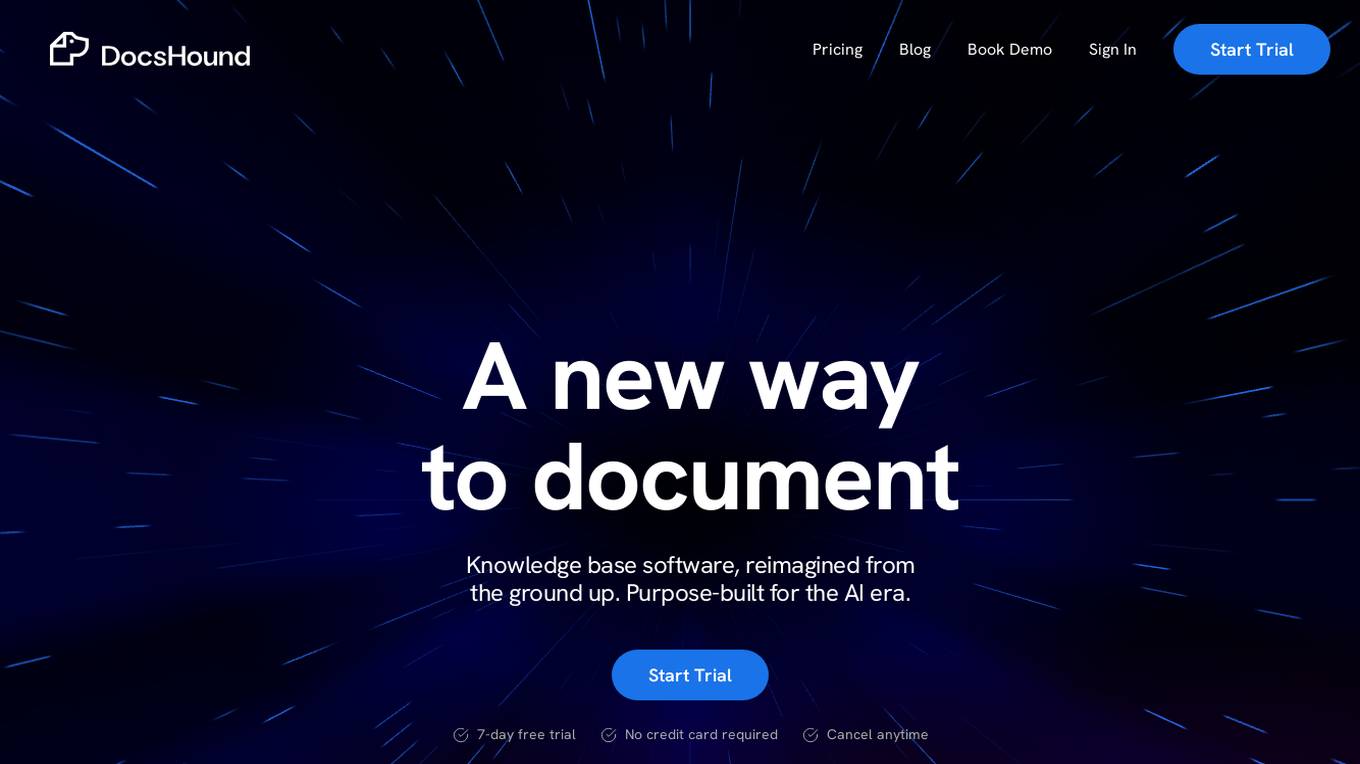
DocsHound
DocsHound is an AI automated documentation platform that revolutionizes knowledge base software by offering a purpose-built solution for the AI era. It simplifies the process of creating manuals by automating the output based on user input. With a focus on product managers, founders, engineers, writers, and customer success professionals, DocsHound provides a modular editing interface with a suite of AI features, efficient publishing workflow, on-brand styling options, and an adaptive AI engine calibrated to user interactions.
20 - Open Source Tools
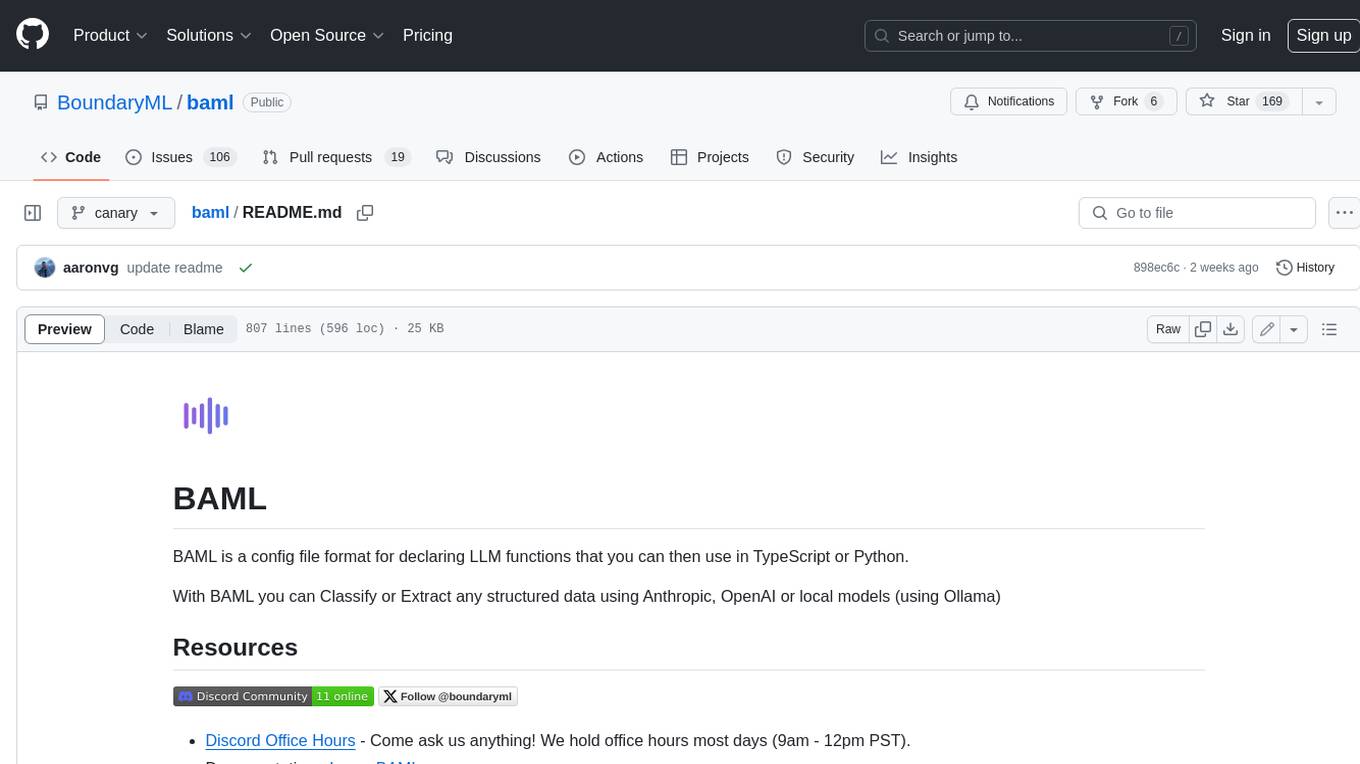
baml
BAML is a config file format for declaring LLM functions that you can then use in TypeScript or Python. With BAML you can Classify or Extract any structured data using Anthropic, OpenAI or local models (using Ollama) ## Resources  [Discord Community](https://discord.gg/boundaryml)  [Follow us on Twitter](https://twitter.com/boundaryml) * Discord Office Hours - Come ask us anything! We hold office hours most days (9am - 12pm PST). * Documentation - Learn BAML * Documentation - BAML Syntax Reference * Documentation - Prompt engineering tips * Boundary Studio - Observability and more #### Starter projects * BAML + NextJS 14 * BAML + FastAPI + Streaming ## Motivation Calling LLMs in your code is frustrating: * your code uses types everywhere: classes, enums, and arrays * but LLMs speak English, not types BAML makes calling LLMs easy by taking a type-first approach that lives fully in your codebase: 1. Define what your LLM output type is in a .baml file, with rich syntax to describe any field (even enum values) 2. Declare your prompt in the .baml config using those types 3. Add additional LLM config like retries or redundancy 4. Transpile the .baml files to a callable Python or TS function with a type-safe interface. (VSCode extension does this for you automatically). We were inspired by similar patterns for type safety: protobuf and OpenAPI for RPCs, Prisma and SQLAlchemy for databases. BAML guarantees type safety for LLMs and comes with tools to give you a great developer experience:  Jump to BAML code or how Flexible Parsing works without additional LLM calls. | BAML Tooling | Capabilities | | ----------------------------------------------------------------------------------------- | ---------------------------------------------------------------------------------------------------------------------------------------------------------------------------------------------------------------------------------------------------------------------------------------------------------------------------------- | | BAML Compiler install | Transpiles BAML code to a native Python / Typescript library (you only need it for development, never for releases) Works on Mac, Windows, Linux  | | VSCode Extension install | Syntax highlighting for BAML files Real-time prompt preview Testing UI | | Boundary Studio open (not open source) | Type-safe observability Labeling |
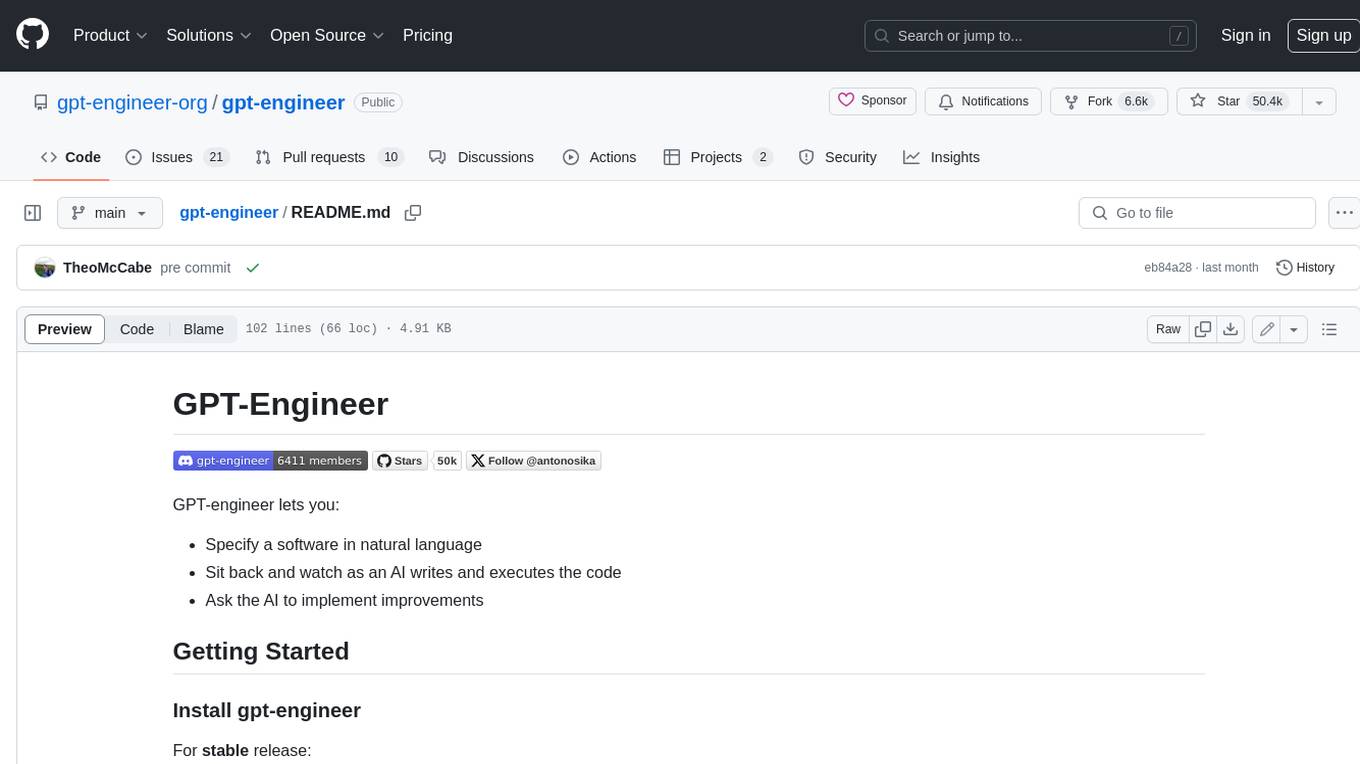
gpt-engineer
GPT-Engineer is a tool that allows you to specify a software in natural language, sit back and watch as an AI writes and executes the code, and ask the AI to implement improvements.
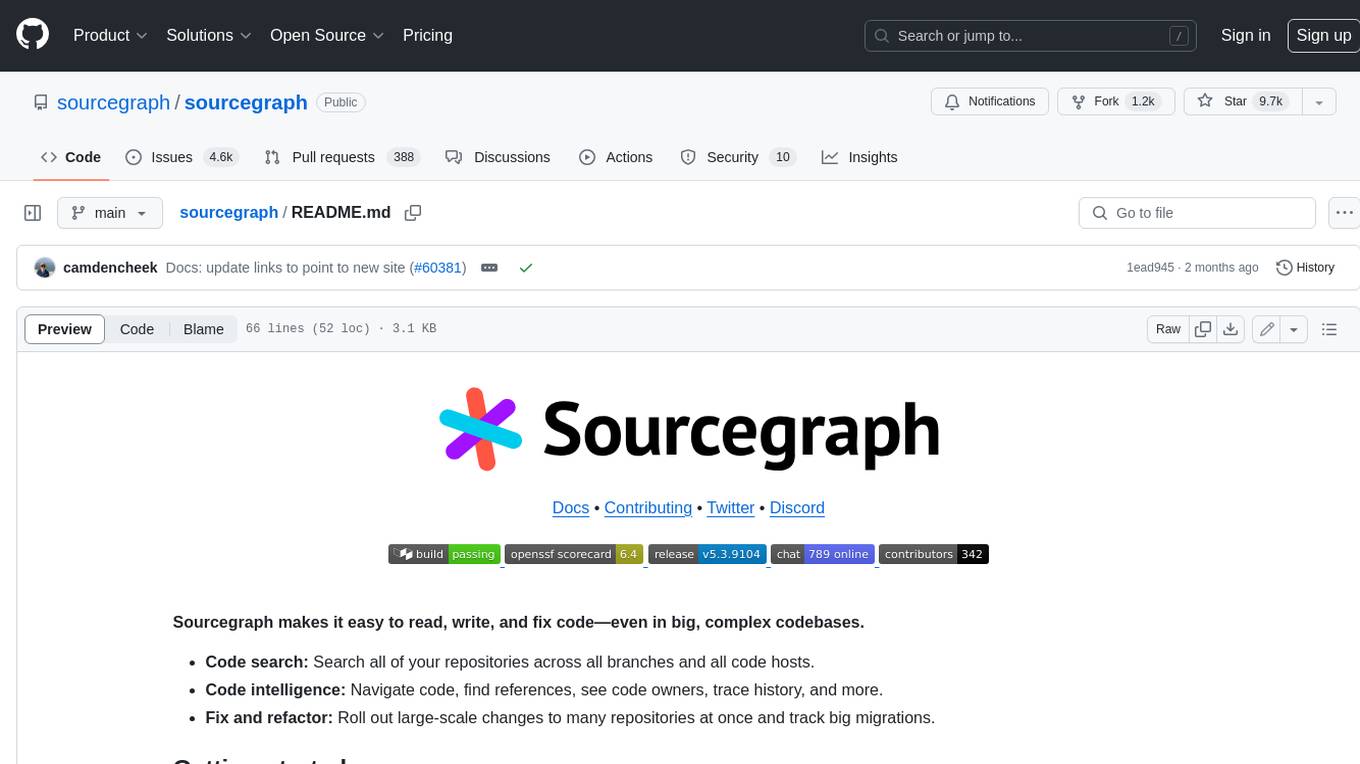
sourcegraph
Sourcegraph is a code search and navigation tool that helps developers read, write, and fix code in large, complex codebases. It provides features such as code search across all repositories and branches, code intelligence for navigation and refactoring, and the ability to fix and refactor code across multiple repositories at once.
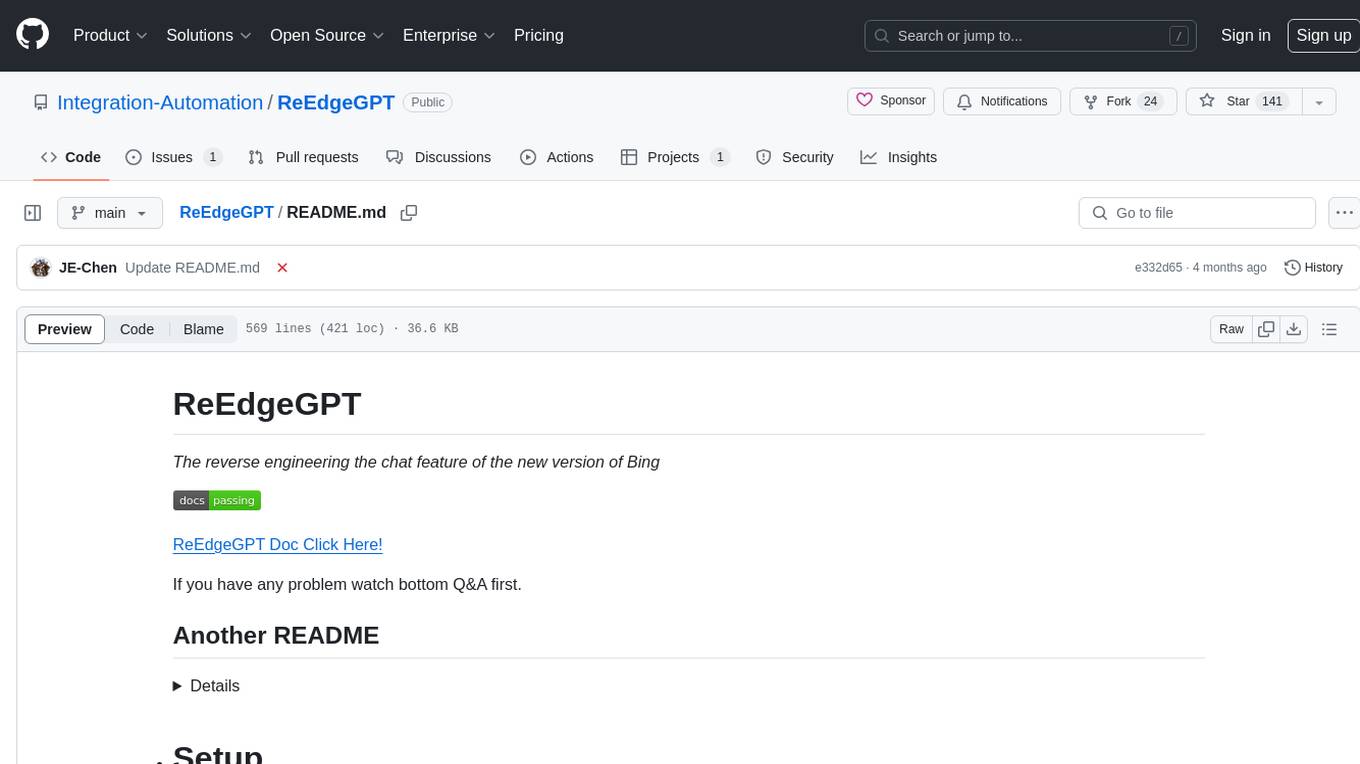
ReEdgeGPT
ReEdgeGPT is a tool designed for reverse engineering the chat feature of the new version of Bing. It provides documentation and guidance on how to collect and use cookies to access the chat feature. The tool allows users to create a chatbot using the collected cookies and interact with the Bing GPT chatbot. It also offers support for different modes like Copilot and Bing, along with plugins for various tasks. The tool covers historical information about Rome, the Lazio region, and provides troubleshooting tips for common issues encountered while using the tool.
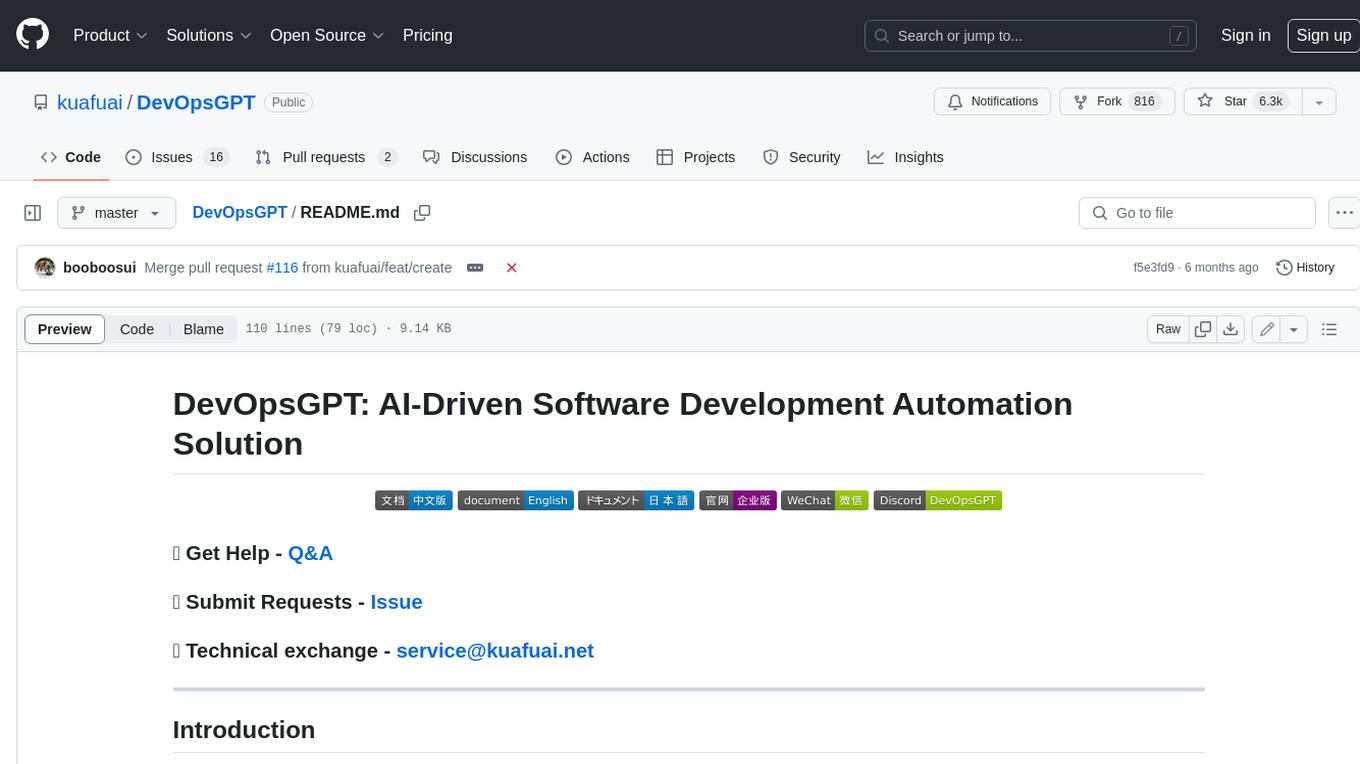
DevOpsGPT
DevOpsGPT is an AI-driven software development automation solution that combines Large Language Models (LLM) with DevOps tools to convert natural language requirements into working software. It improves development efficiency by eliminating the need for tedious requirement documentation, shortens development cycles, reduces communication costs, and ensures high-quality deliverables. The Enterprise Edition offers features like existing project analysis, professional model selection, and support for more DevOps platforms. The tool automates requirement development, generates interface documentation, provides pseudocode based on existing projects, facilitates code refinement, enables continuous integration, and supports software version release. Users can run DevOpsGPT with source code or Docker, and the tool comes with limitations in precise documentation generation and understanding existing project code. The product roadmap includes accurate requirement decomposition, rapid import of development requirements, and integration of more software engineering and professional tools for efficient software development tasks under AI planning and execution.
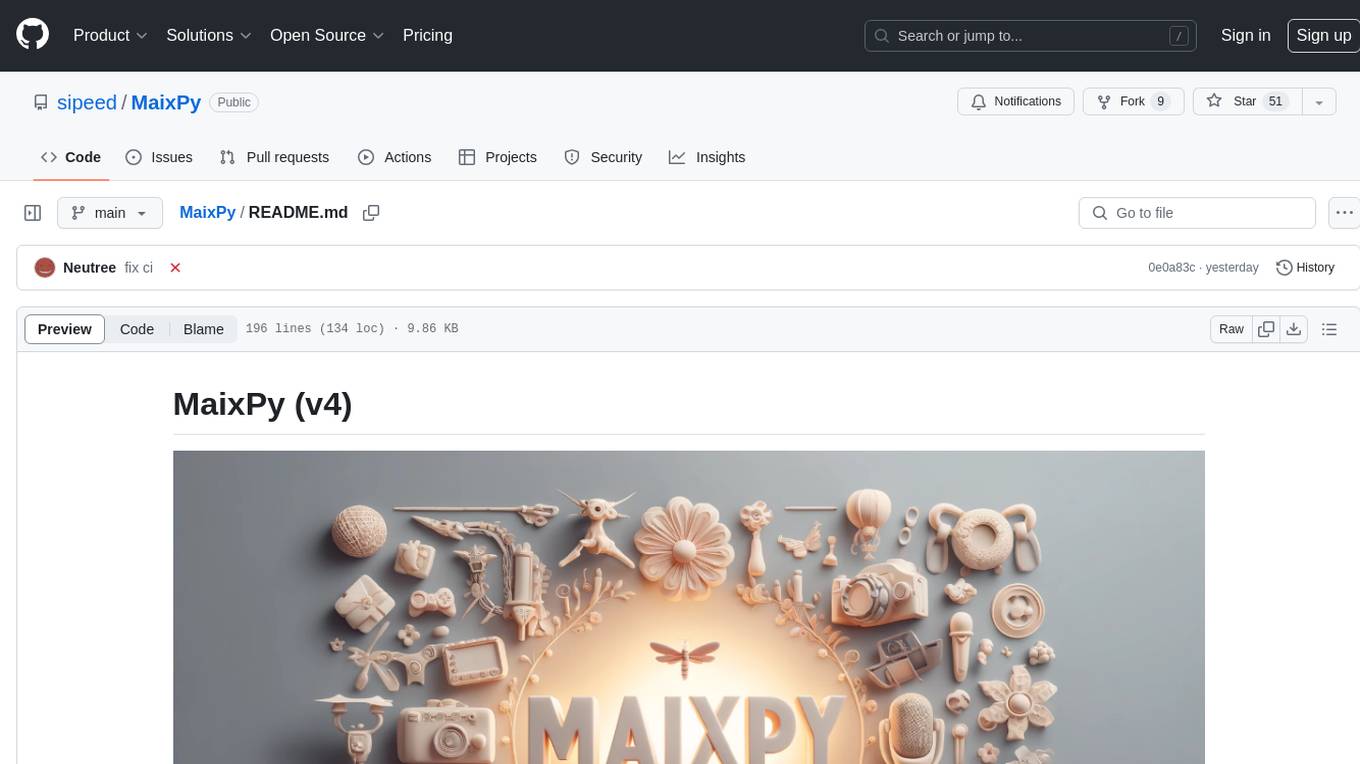
MaixPy
MaixPy is a Python SDK that enables users to easily create AI vision projects on edge devices. It provides a user-friendly API for accessing NPU, making it suitable for AI Algorithm Engineers, STEM teachers, Makers, Engineers, Students, Enterprises, and Contestants. The tool supports Python programming, MaixVision Workstation, AI vision, video streaming, voice recognition, and peripheral usage. It also offers an online AI training platform called MaixHub. MaixPy is designed for new hardware platforms like MaixCAM, offering improved performance and features compared to older versions. The ecosystem includes hardware, software, tools, documentation, and a cloud platform.
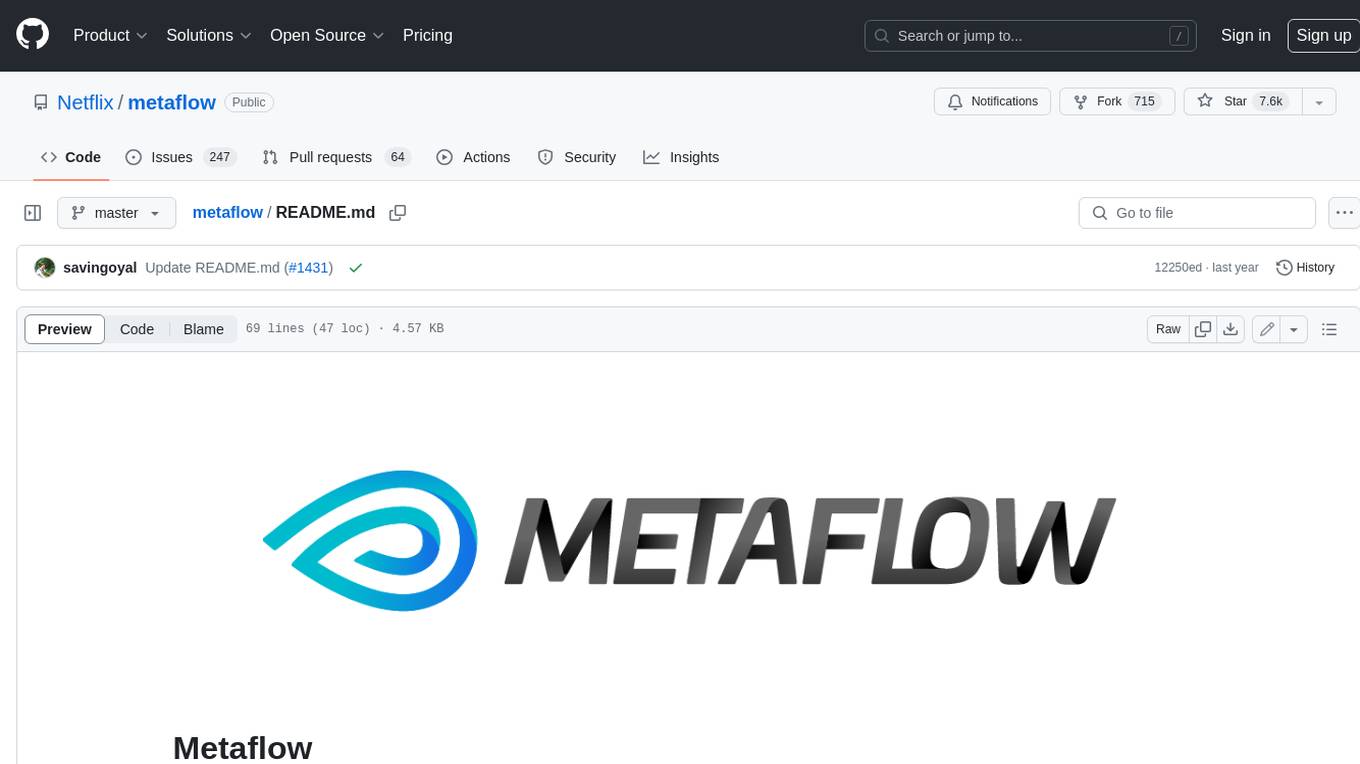
metaflow
Metaflow is a user-friendly library designed to assist scientists and engineers in developing and managing real-world data science projects. Initially created at Netflix, Metaflow aimed to enhance the productivity of data scientists working on diverse projects ranging from traditional statistics to cutting-edge deep learning. For further information, refer to Metaflow's website and documentation.
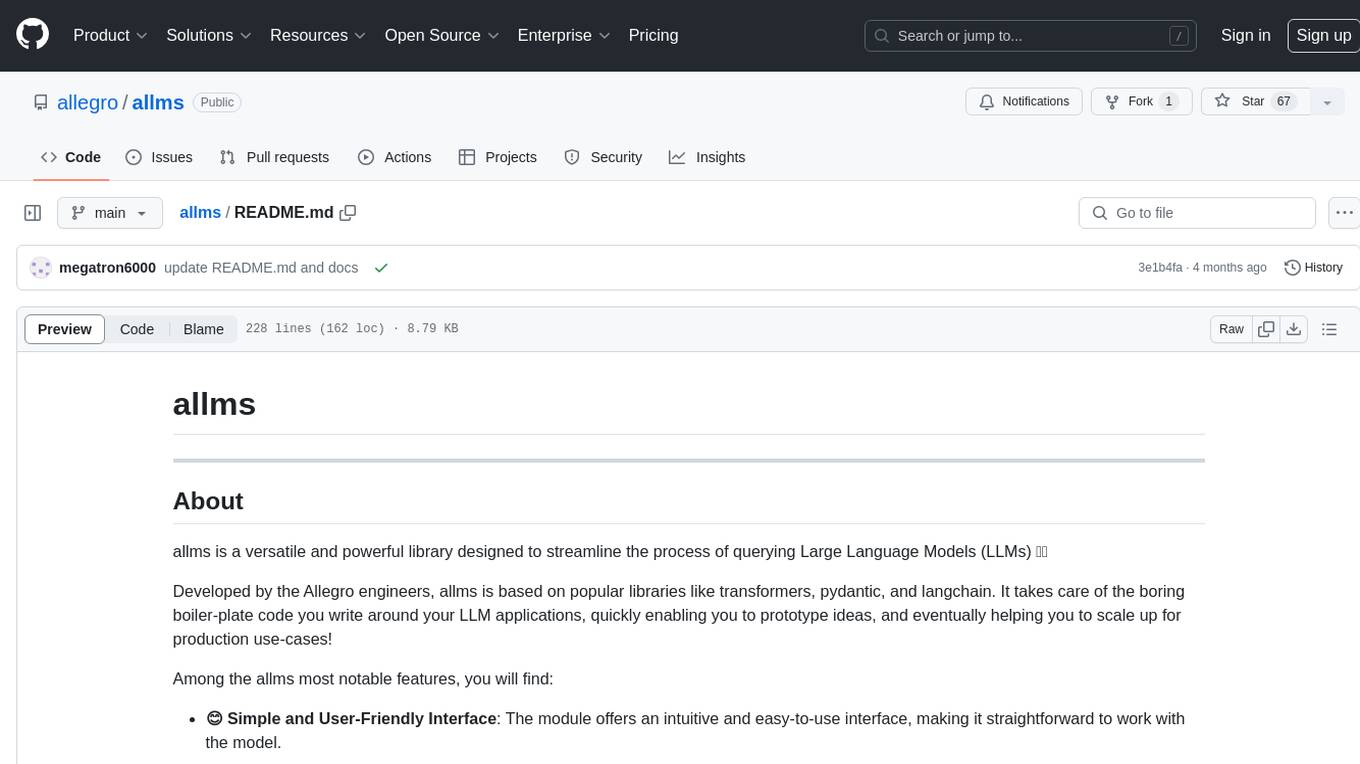
allms
allms is a versatile and powerful library designed to streamline the process of querying Large Language Models (LLMs). Developed by Allegro engineers, it simplifies working with LLM applications by providing a user-friendly interface, asynchronous querying, automatic retrying mechanism, error handling, and output parsing. It supports various LLM families hosted on different platforms like OpenAI, Google, Azure, and GCP. The library offers features for configuring endpoint credentials, batch querying with symbolic variables, and forcing structured output format. It also provides documentation, quickstart guides, and instructions for local development, testing, updating documentation, and making new releases.
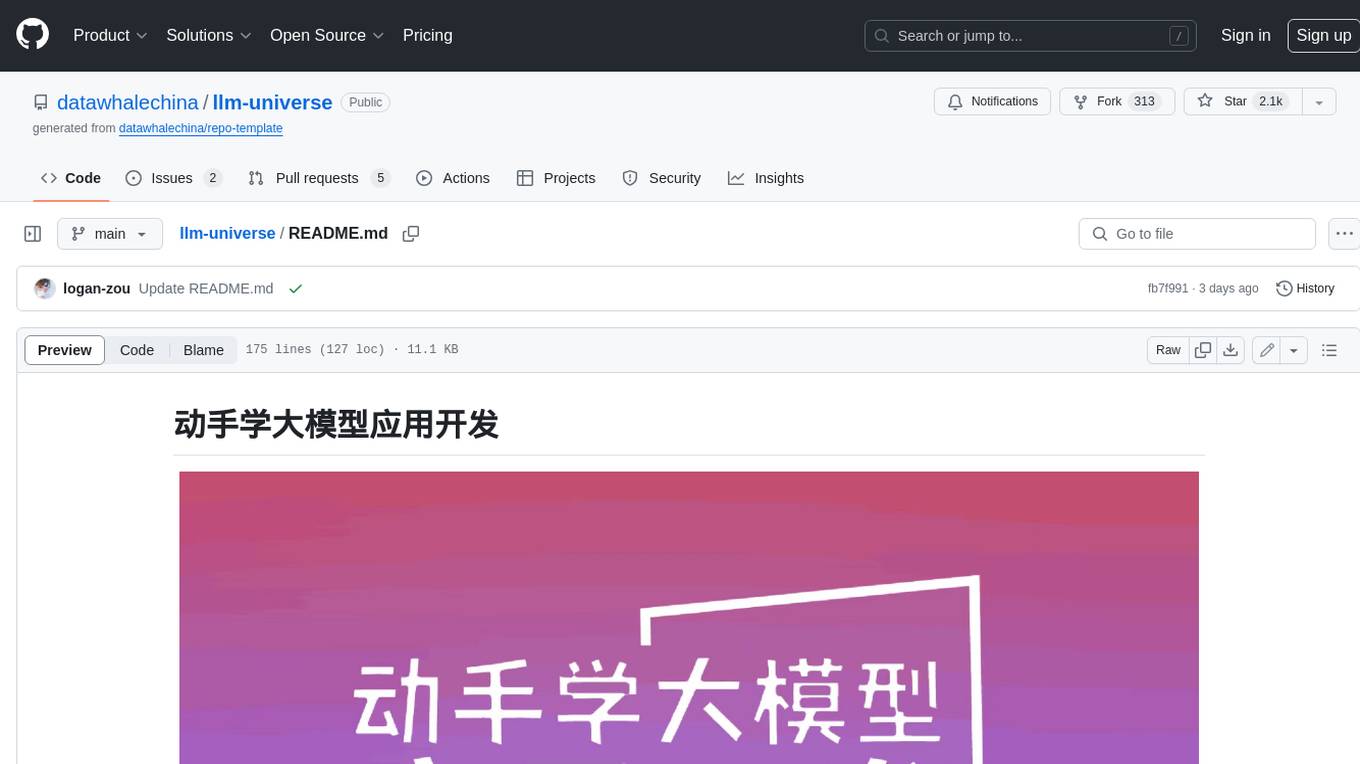
llm-universe
This project is a tutorial on developing large model applications for novice developers. It aims to provide a comprehensive introduction to large model development, focusing on Alibaba Cloud servers and integrating personal knowledge assistant projects. The tutorial covers the following topics: 1. **Introduction to Large Models**: A simplified introduction for novice developers on what large models are, their characteristics, what LangChain is, and how to develop an LLM application. 2. **How to Call Large Model APIs**: This section introduces various methods for calling APIs of well-known domestic and foreign large model products, including calling native APIs, encapsulating them as LangChain LLMs, and encapsulating them as Fastapi calls. It also provides a unified encapsulation for various large model APIs, such as Baidu Wenxin, Xunfei Xinghuo, and Zh譜AI. 3. **Knowledge Base Construction**: Loading, processing, and vector database construction of different types of knowledge base documents. 4. **Building RAG Applications**: Integrating LLM into LangChain to build a retrieval question and answer chain, and deploying applications using Streamlit. 5. **Verification and Iteration**: How to implement verification and iteration in large model development, and common evaluation methods. The project consists of three main parts: 1. **Introduction to LLM Development**: A simplified version of V1 aims to help beginners get started with LLM development quickly and conveniently, understand the general process of LLM development, and build a simple demo. 2. **LLM Development Techniques**: More advanced LLM development techniques, including but not limited to: Prompt Engineering, processing of multiple types of source data, optimizing retrieval, recall ranking, Agent framework, etc. 3. **LLM Application Examples**: Introduce some successful open source cases, analyze the ideas, core concepts, and implementation frameworks of these application examples from the perspective of this course, and help beginners understand what kind of applications they can develop through LLM. Currently, the first part has been completed, and everyone is welcome to read and learn; the second and third parts are under creation. **Directory Structure Description**: requirements.txt: Installation dependencies in the official environment notebook: Notebook source code file docs: Markdown documentation file figures: Pictures data_base: Knowledge base source file used
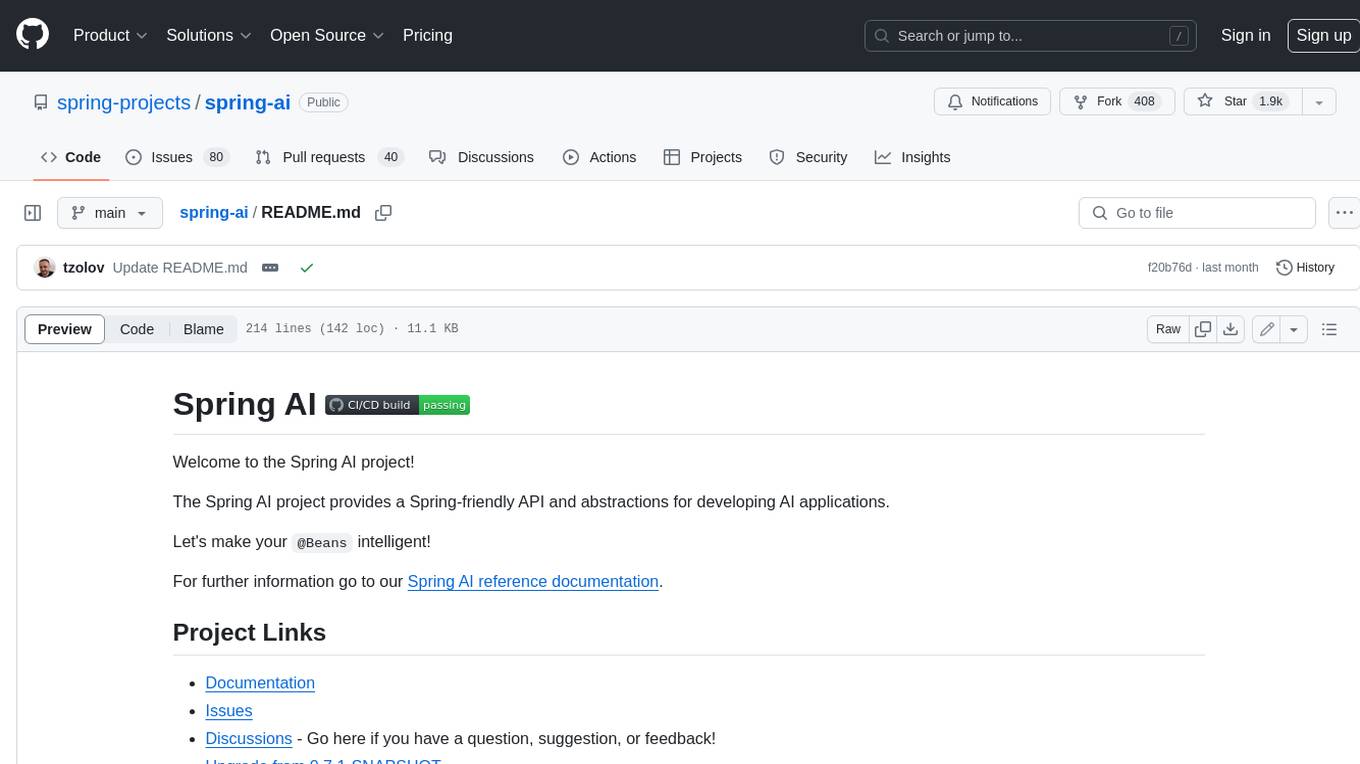
spring-ai
The Spring AI project provides a Spring-friendly API and abstractions for developing AI applications. It offers a portable client API for interacting with generative AI models, enabling developers to easily swap out implementations and access various models like OpenAI, Azure OpenAI, and HuggingFace. Spring AI also supports prompt engineering, providing classes and interfaces for creating and parsing prompts, as well as incorporating proprietary data into generative AI without retraining the model. This is achieved through Retrieval Augmented Generation (RAG), which involves extracting, transforming, and loading data into a vector database for use by AI models. Spring AI's VectorStore abstraction allows for seamless transitions between different vector database implementations.
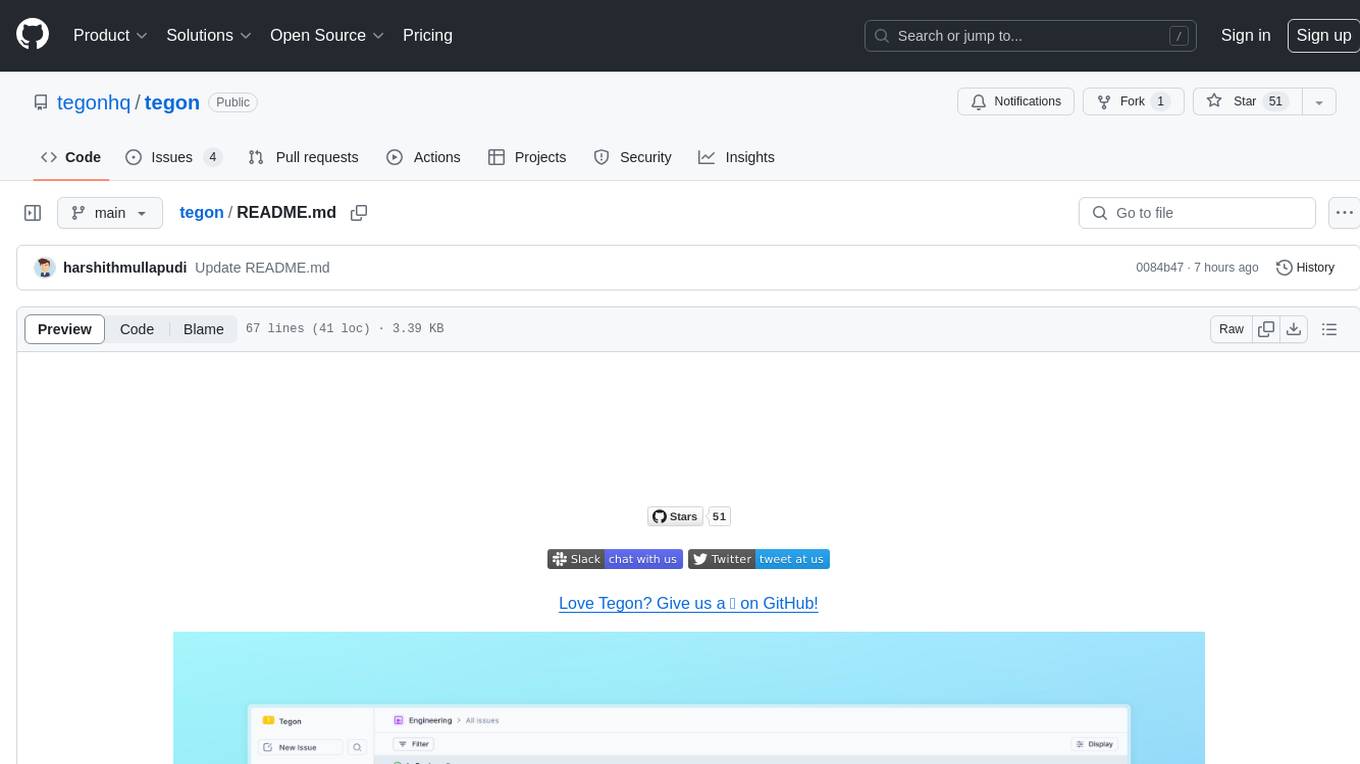
tegon
Tegon is an open-source AI-First issue tracking tool designed for engineering teams. It aims to simplify task management by leveraging AI and integrations to automate task creation, prioritize tasks, and enhance bug resolution. Tegon offers features like issues tracking, automatic title generation, AI-generated labels and assignees, custom views, and upcoming features like sprints and task prioritization. It integrates with GitHub, Slack, and Sentry to streamline issue tracking processes. Tegon also plans to introduce AI Agents like PR Agent and Bug Agent to enhance product management and bug resolution. Contributions are welcome, and the product is licensed under the MIT License.

airbyte
Airbyte is an open-source data integration platform that makes it easy to move data from any source to any destination. With Airbyte, you can build and manage data pipelines without writing any code. Airbyte provides a library of pre-built connectors that make it easy to connect to popular data sources and destinations. You can also create your own connectors using Airbyte's no-code Connector Builder or low-code CDK. Airbyte is used by data engineers and analysts at companies of all sizes to build and manage their data pipelines.
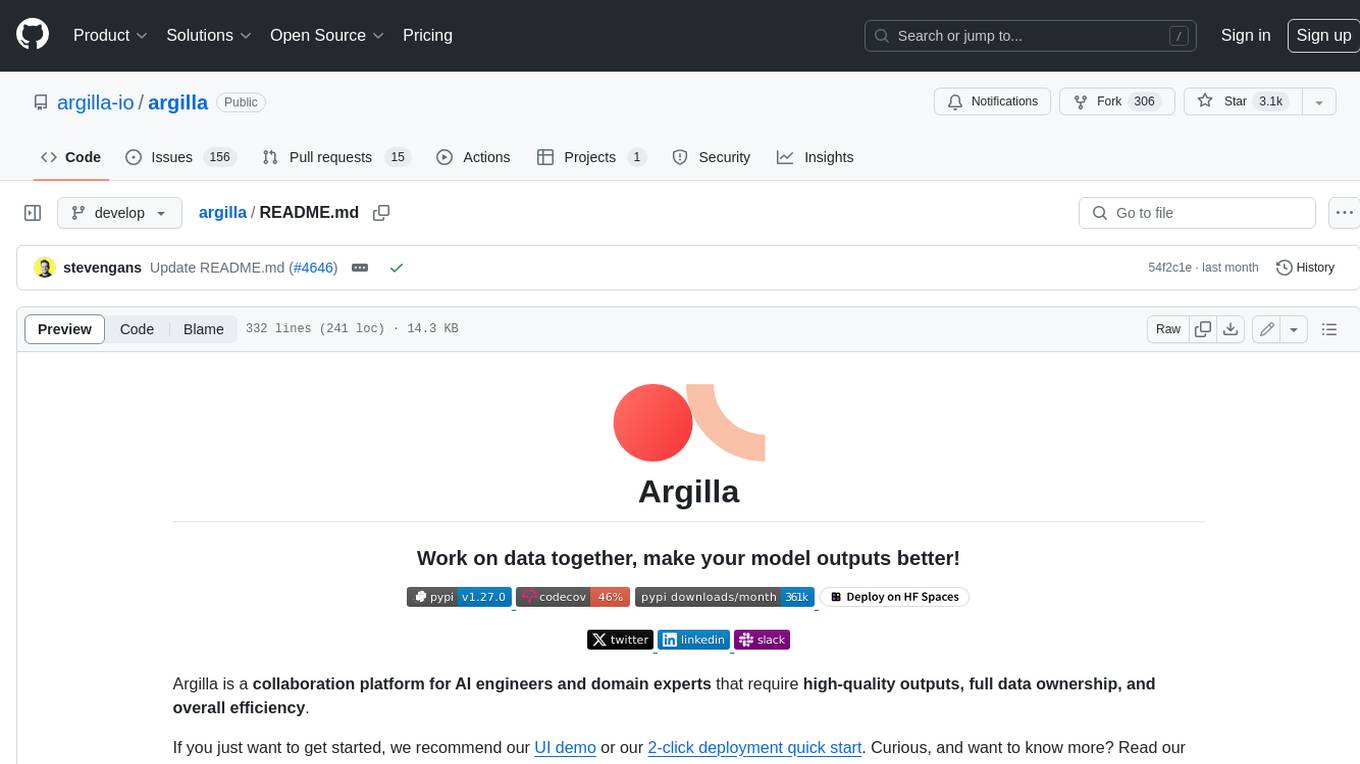
argilla
Argilla is a collaboration platform for AI engineers and domain experts that require high-quality outputs, full data ownership, and overall efficiency. It helps users improve AI output quality through data quality, take control of their data and models, and improve efficiency by quickly iterating on the right data and models. Argilla is an open-source community-driven project that provides tools for achieving and maintaining high-quality data standards, with a focus on NLP and LLMs. It is used by AI teams from companies like the Red Cross, Loris.ai, and Prolific to improve the quality and efficiency of AI projects.

devika
Devika is an advanced AI software engineer that can understand high-level human instructions, break them down into steps, research relevant information, and write code to achieve the given objective. Devika utilizes large language models, planning and reasoning algorithms, and web browsing abilities to intelligently develop software. Devika aims to revolutionize the way we build software by providing an AI pair programmer who can take on complex coding tasks with minimal human guidance. Whether you need to create a new feature, fix a bug, or develop an entire project from scratch, Devika is here to assist you.
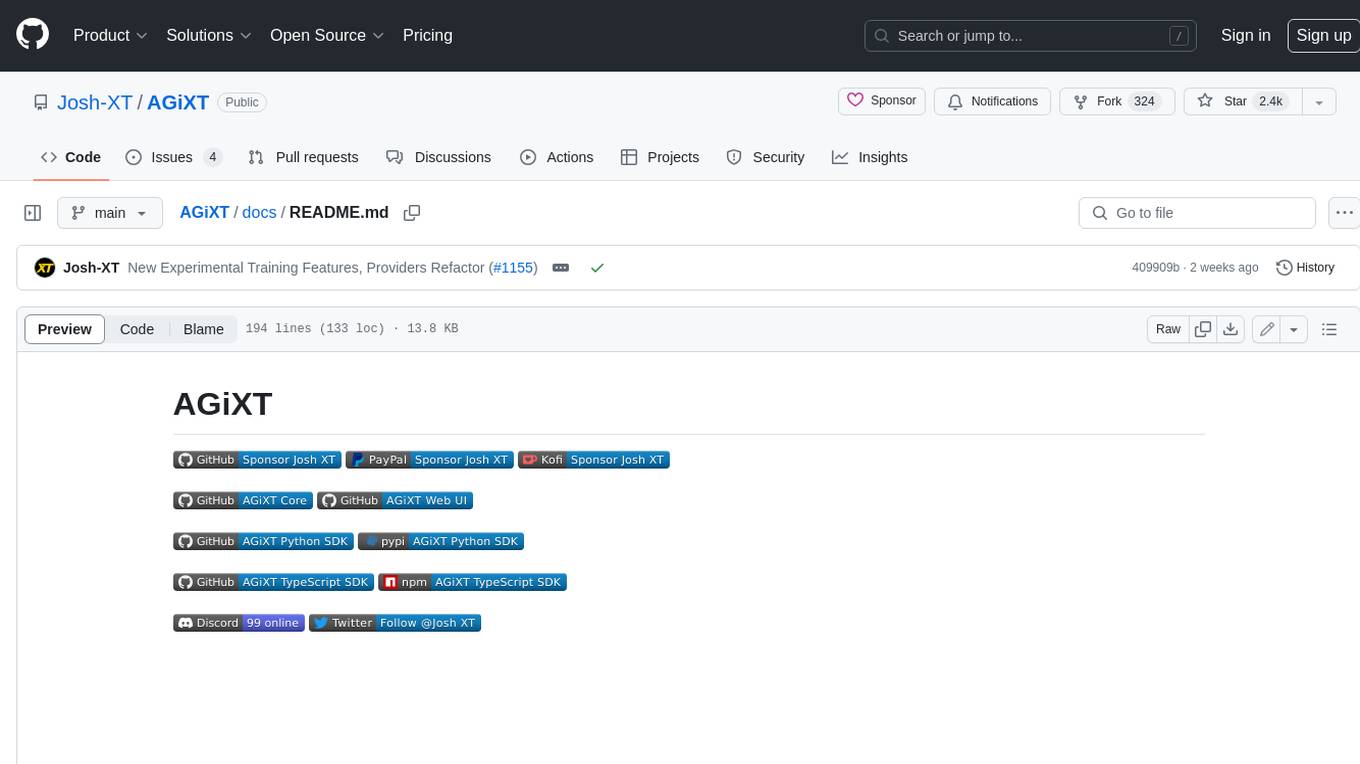
AGiXT
AGiXT is a dynamic Artificial Intelligence Automation Platform engineered to orchestrate efficient AI instruction management and task execution across a multitude of providers. Our solution infuses adaptive memory handling with a broad spectrum of commands to enhance AI's understanding and responsiveness, leading to improved task completion. The platform's smart features, like Smart Instruct and Smart Chat, seamlessly integrate web search, planning strategies, and conversation continuity, transforming the interaction between users and AI. By leveraging a powerful plugin system that includes web browsing and command execution, AGiXT stands as a versatile bridge between AI models and users. With an expanding roster of AI providers, code evaluation capabilities, comprehensive chain management, and platform interoperability, AGiXT is consistently evolving to drive a multitude of applications, affirming its place at the forefront of AI technology.
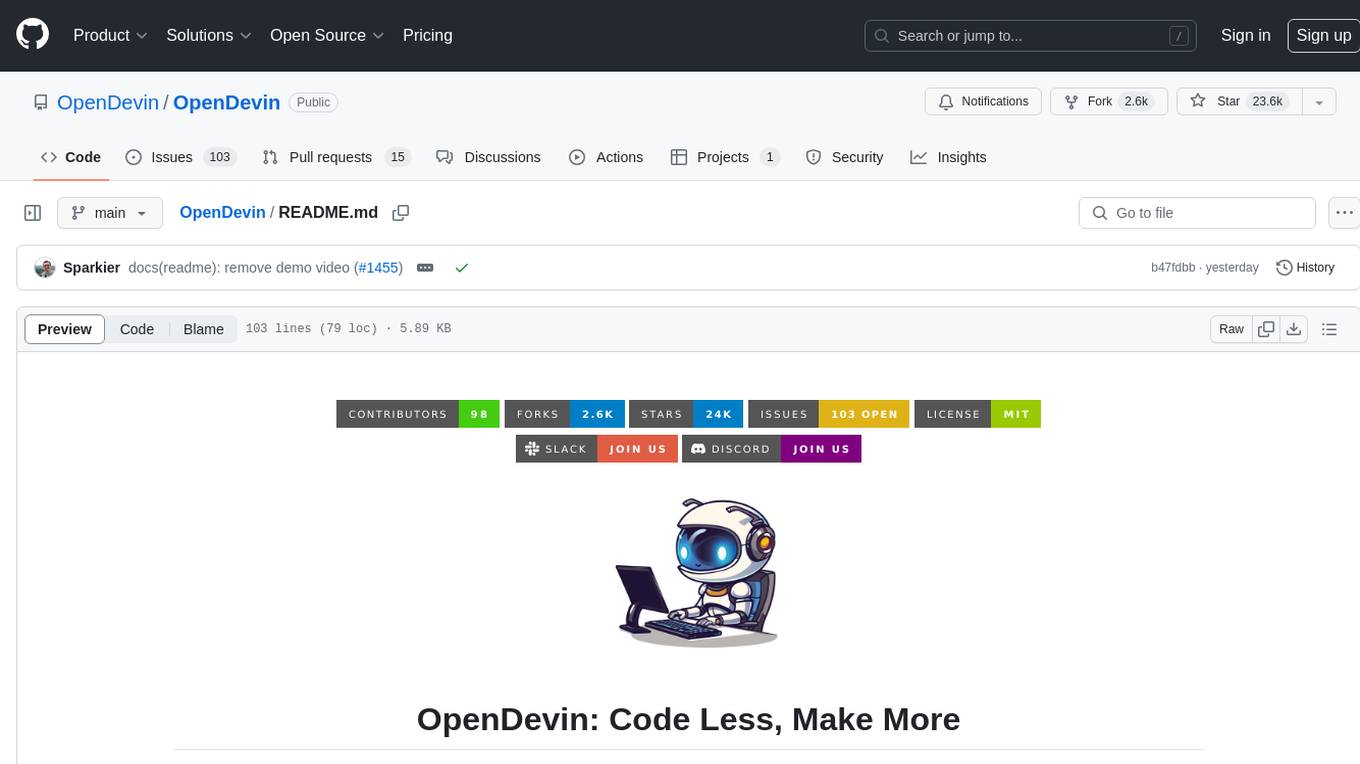
OpenDevin
OpenDevin is an open-source project aiming to replicate Devin, an autonomous AI software engineer capable of executing complex engineering tasks and collaborating actively with users on software development projects. The project aspires to enhance and innovate upon Devin through the power of the open-source community. Users can contribute to the project by developing core functionalities, frontend interface, or sandboxing solutions, participating in research and evaluation of LLMs in software engineering, and providing feedback and testing on the OpenDevin toolset.
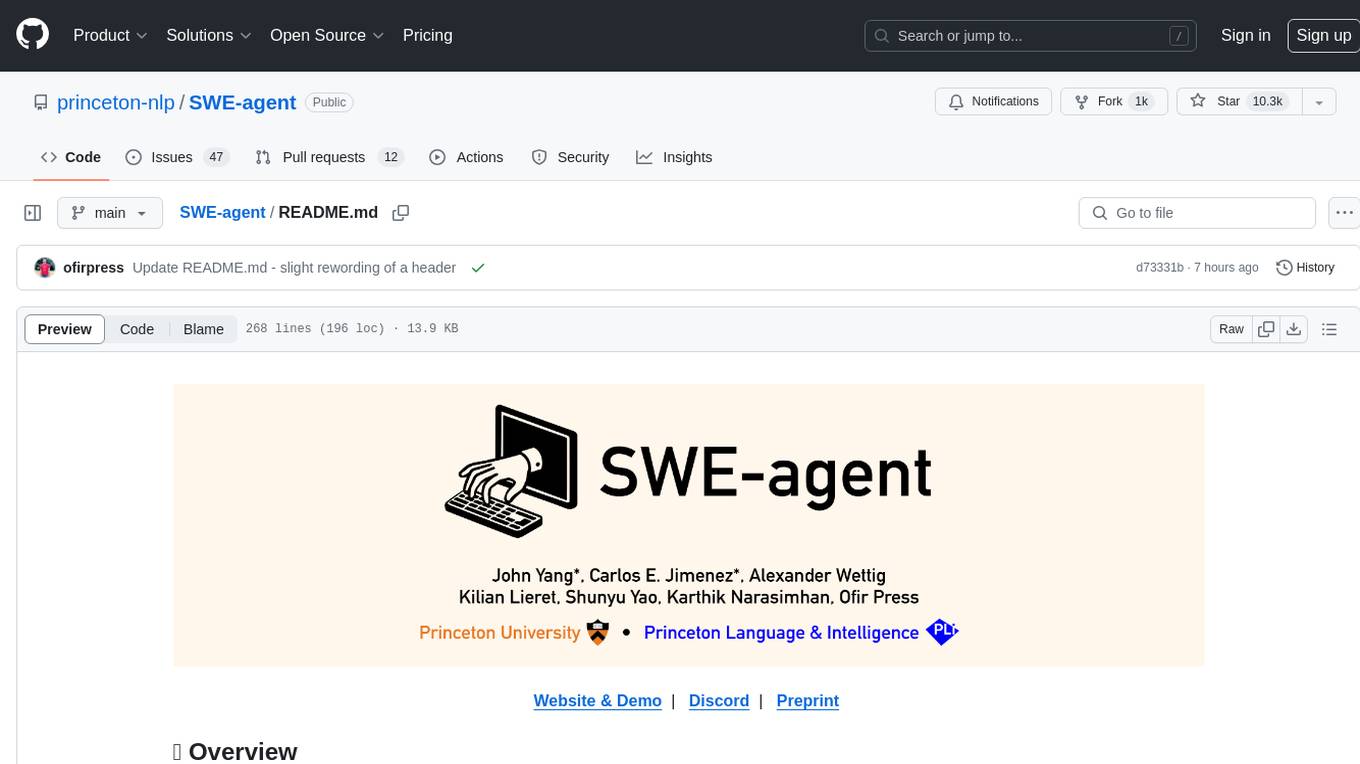
SWE-agent
SWE-agent is a tool that turns language models (e.g. GPT-4) into software engineering agents capable of fixing bugs and issues in real GitHub repositories. It achieves state-of-the-art performance on the full test set by resolving 12.29% of issues. The tool is built and maintained by researchers from Princeton University. SWE-agent provides a command line tool and a graphical web interface for developers to interact with. It introduces an Agent-Computer Interface (ACI) to facilitate browsing, viewing, editing, and executing code files within repositories. The tool includes features such as a linter for syntax checking, a specialized file viewer, and a full-directory string searching command to enhance the agent's capabilities. SWE-agent aims to improve prompt engineering and ACI design to enhance the performance of language models in software engineering tasks.
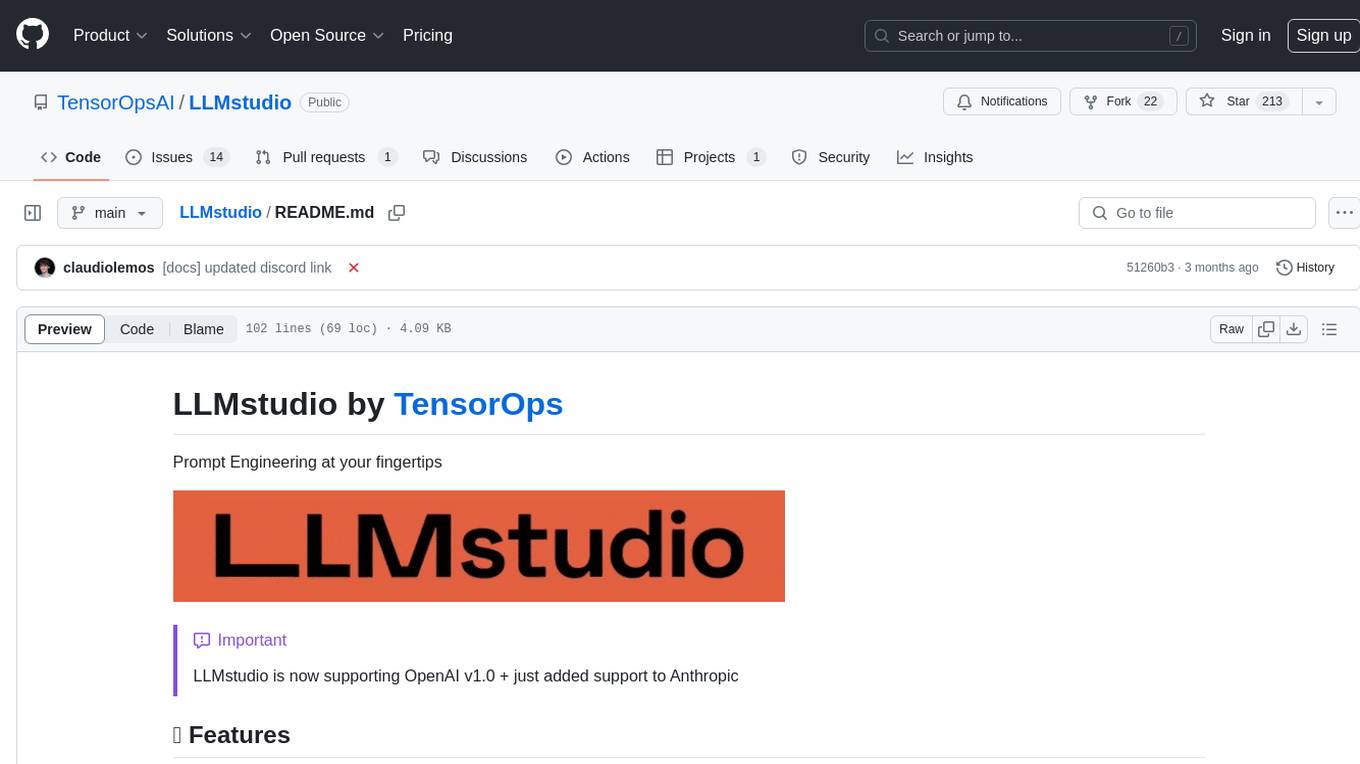
LLMstudio
LLMstudio by TensorOps is a platform that offers prompt engineering tools for accessing models from providers like OpenAI, VertexAI, and Bedrock. It provides features such as Python Client Gateway, Prompt Editing UI, History Management, and Context Limit Adaptability. Users can track past runs, log costs and latency, and export history to CSV. The tool also supports automatic switching to larger-context models when needed. Coming soon features include side-by-side comparison of LLMs, automated testing, API key administration, project organization, and resilience against rate limits. LLMstudio aims to streamline prompt engineering, provide execution history tracking, and enable effortless data export, offering an evolving environment for teams to experiment with advanced language models.
20 - OpenAI Gpts
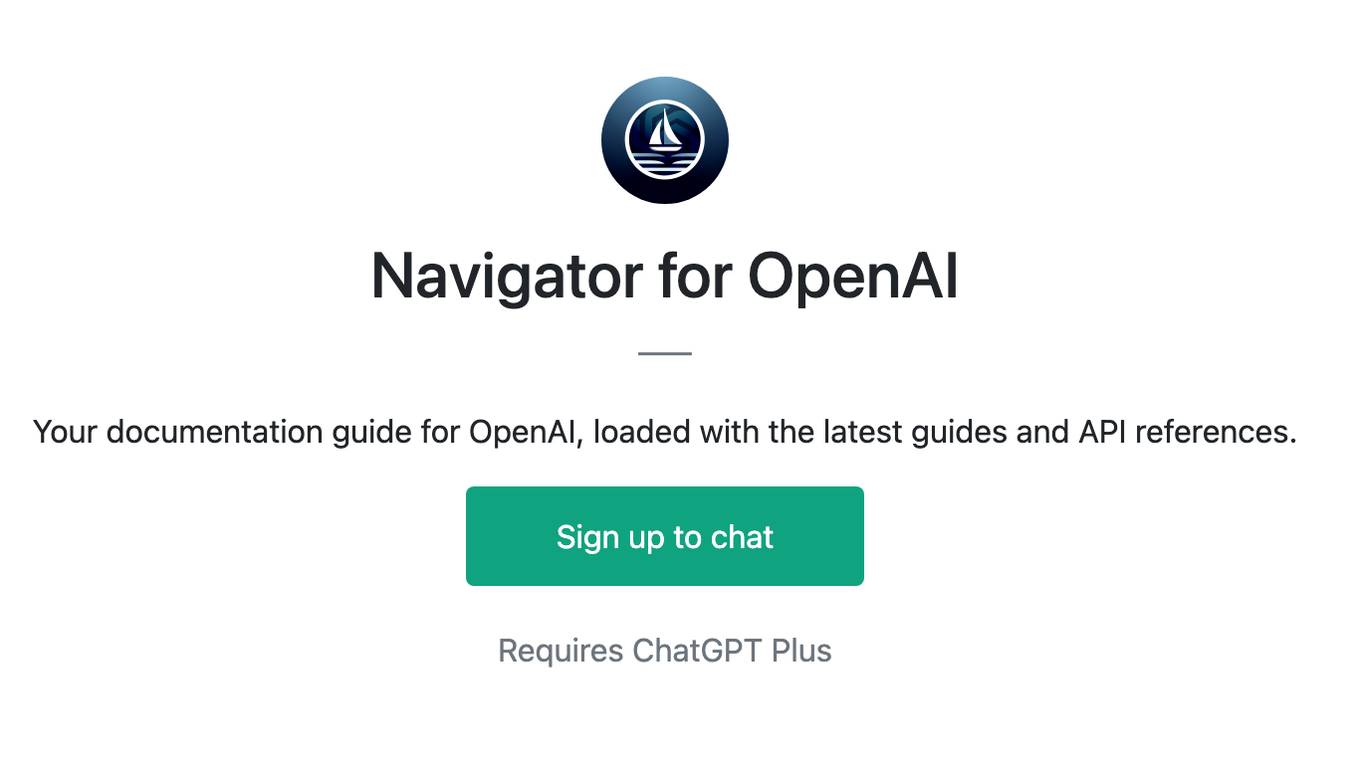
Navigator for OpenAI
Your documentation guide for OpenAI, loaded with the latest guides and API references.
ReScript
Write ReScript code. Trained with versions 10 & 11. Documentation github.com/guillempuche/gpt-rescript
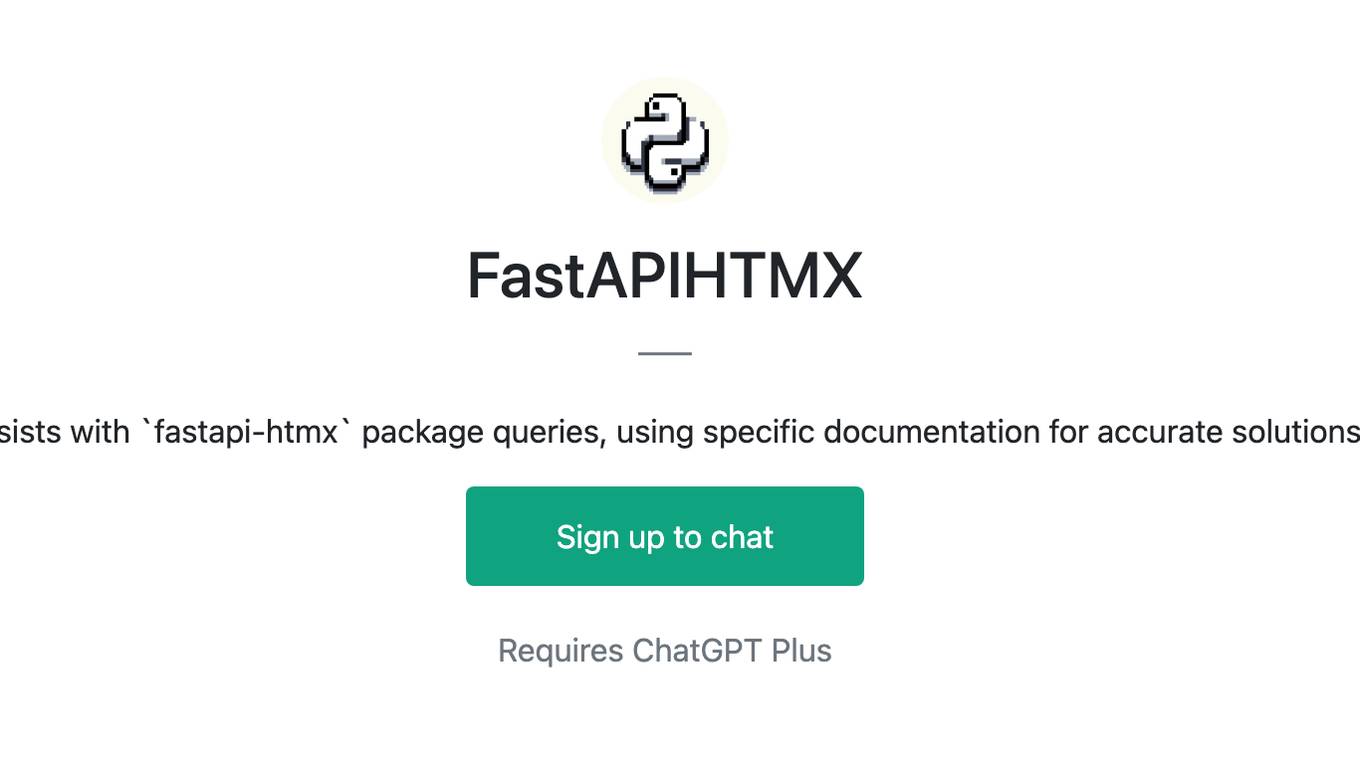
FastAPIHTMX
Assists with `fastapi-htmx` package queries, using specific documentation for accurate solutions.
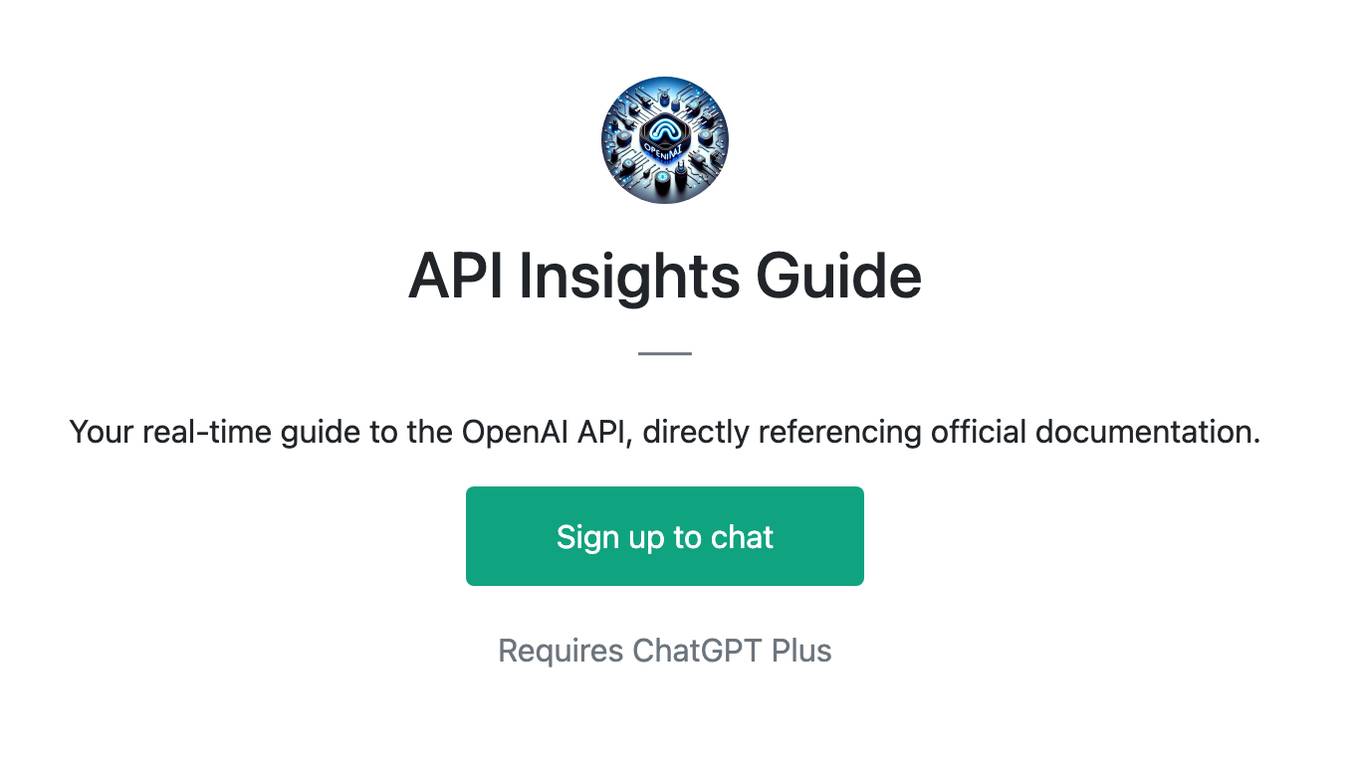
API Insights Guide
Your real-time guide to the OpenAI API, directly referencing official documentation.
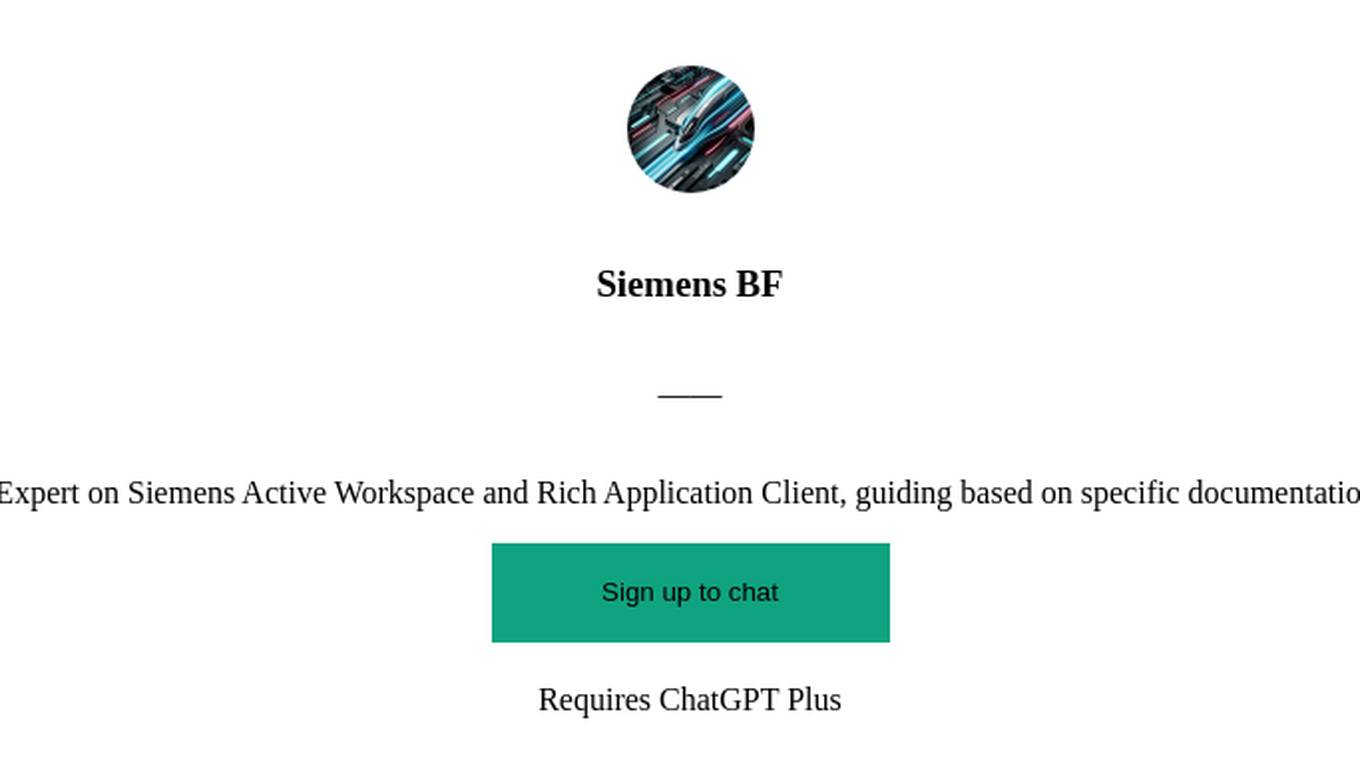
Siemens BF
Expert on Siemens Active Workspace and Rich Application Client, guiding based on specific documentation.
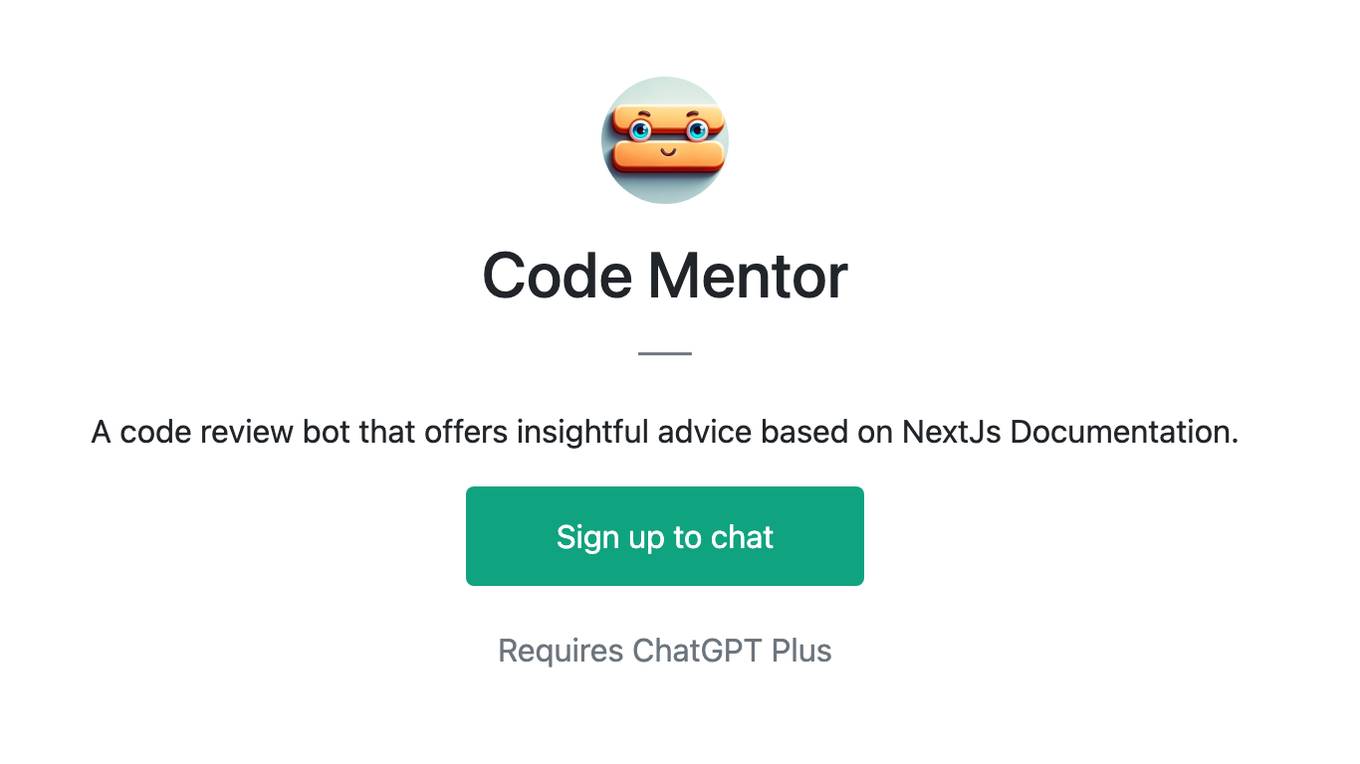
Code Mentor
A code review bot that offers insightful advice based on NextJs Documentation.
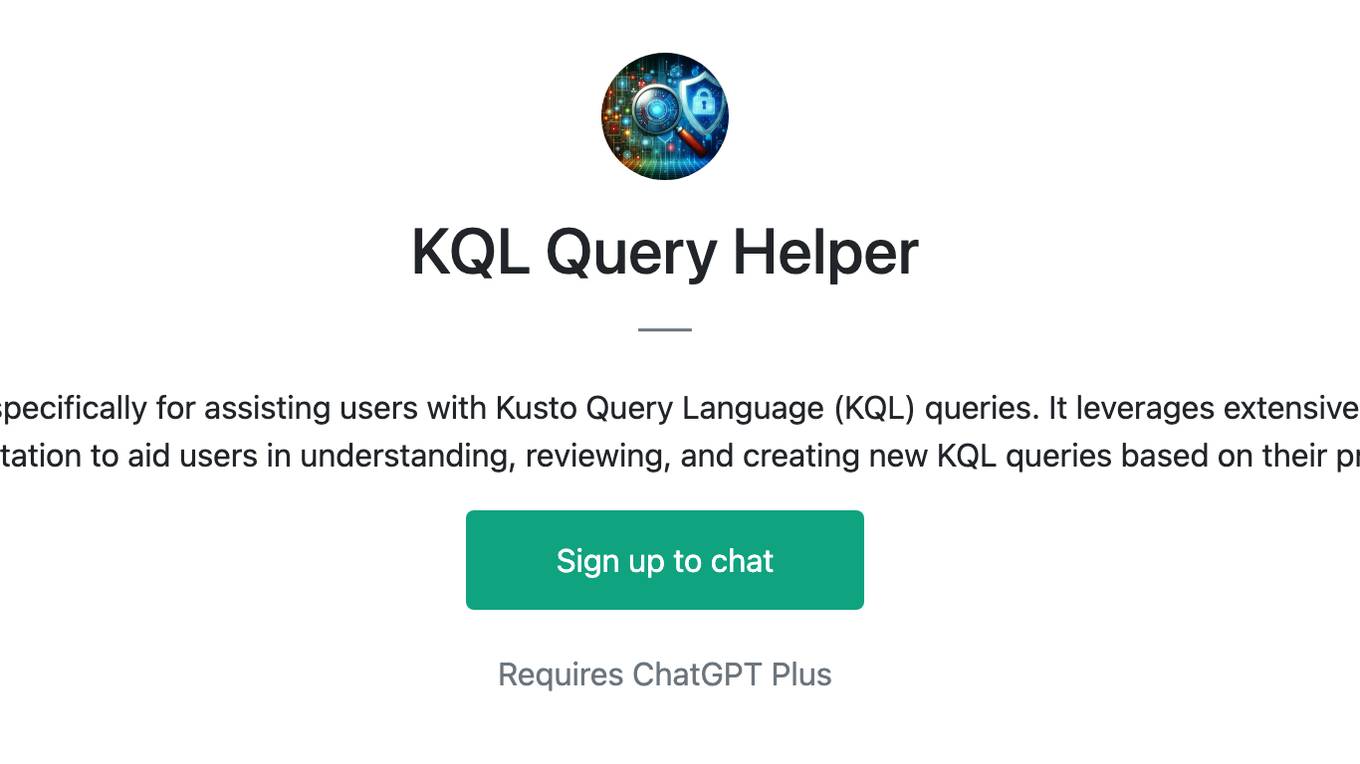
KQL Query Helper
The KQL Query Helper GPT is tailored specifically for assisting users with Kusto Query Language (KQL) queries. It leverages extensive knowledge from Azure Data Explorer documentation to aid users in understanding, reviewing, and creating new KQL queries based on their prompts.
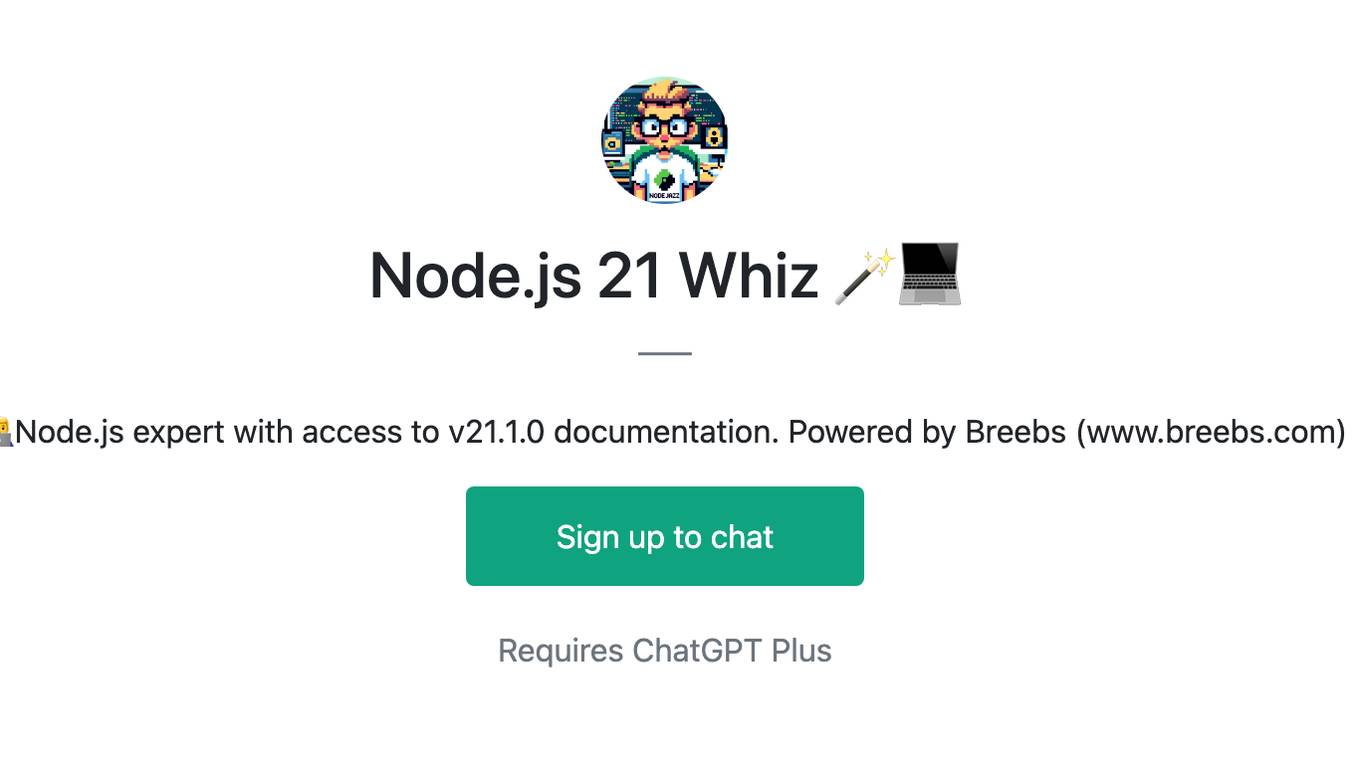
Node.js 21 Whiz 🪄💻
👨💻Node.js expert with access to v21.1.0 documentation. Powered by Breebs (www.breebs.com)
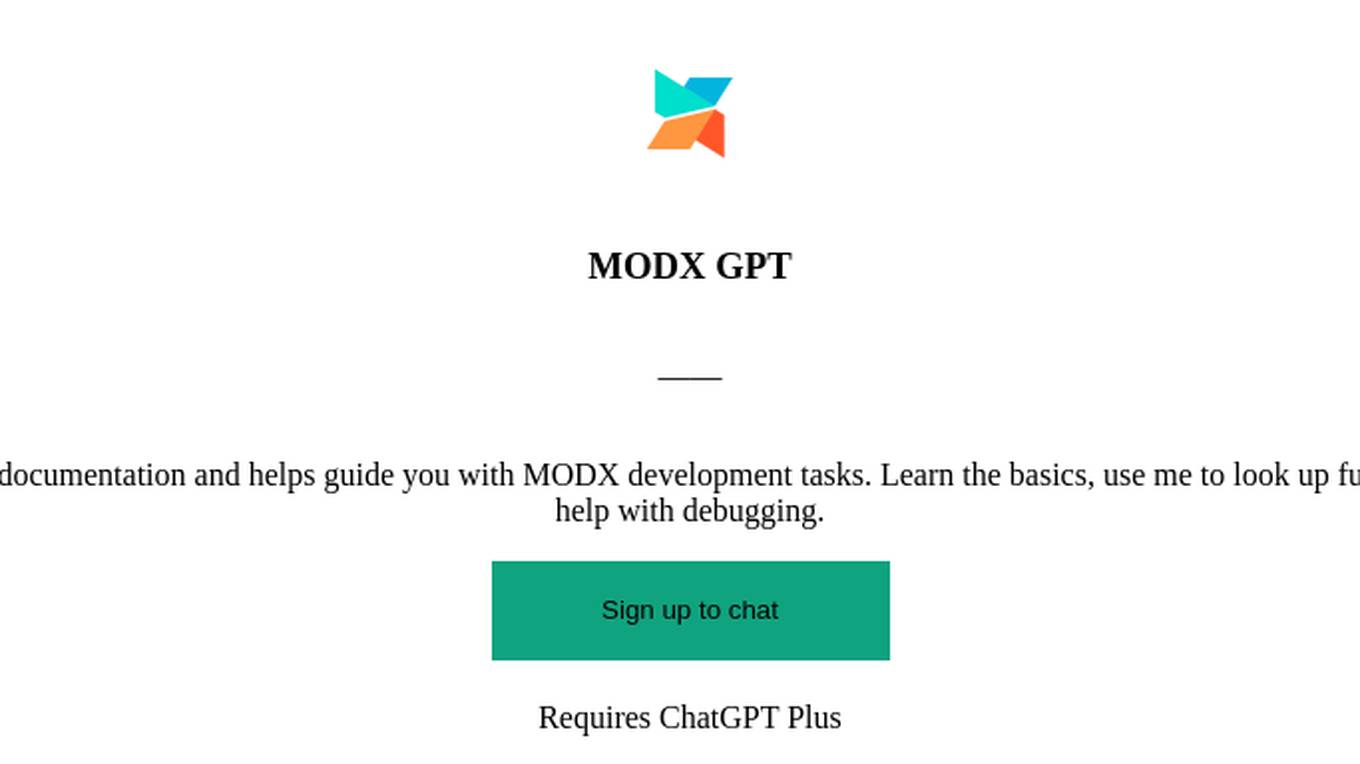
MODX GPT
MODX GPT is trained on the MODX.com CMS documentation and helps guide you with MODX development tasks. Learn the basics, use me to look up function references, discover MODX Extras, or even help with debugging.
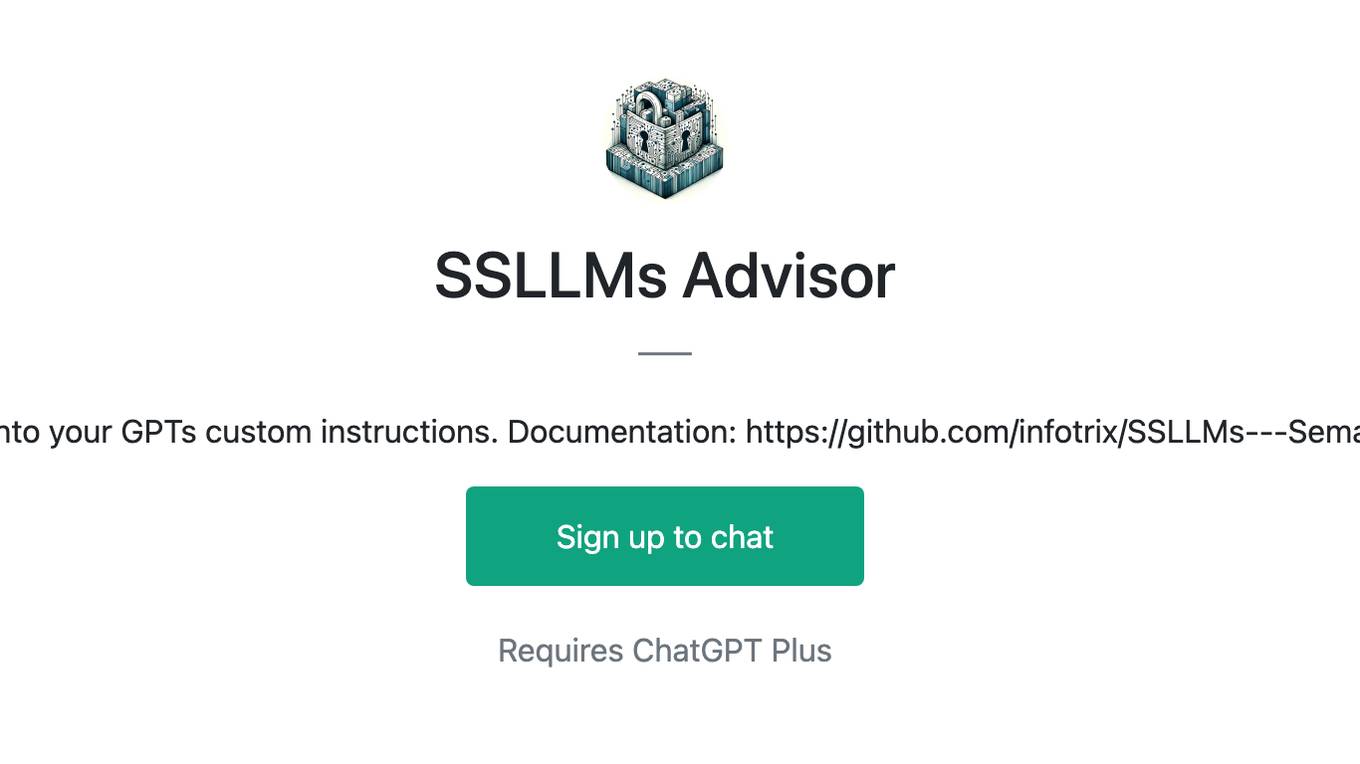
SSLLMs Advisor
Helps you build logic security into your GPTs custom instructions. Documentation: https://github.com/infotrix/SSLLMs---Semantic-Secuirty-for-LLM-GPTs

